THE TOURING BUSINESS HANDBOOK 2025

IN ASSOCIATION WITH






IN ASSOCIATION WITH







As international touring continues to rebound and expand in complexity, so too do the challenges facing artists, managers, promoters, and the many professionals who work behind the scenes to make live events possible. The Touring Business Handbook, which is presented this year in association with Chorus TM is designed to be a vital resource, offering practical guidance and expert insight on key topics such as insurance, taxation, visas, performance rights, currency exchange, and more.
We were inspired to launch this publication last year in response to a clear need for a single, comprehensive source of information that could help industry professionals navigate the intricacies of touring across multiple markets. The incredible response we’ve had confirmed we were on the right path, and for this second edition, we’ve worked closely with specialists across various sectors to refine and expand the content to reflect the latest industry developments.
This year’s edition dives deeper into crucial issues, from the increasing role of digital payments and taxation shifts to the impact of global political and economic trends on touring logistics. We also explore the future of artist mental health support, risk management strategies, and the evolving dynamics of international ticketing and fan engagement.
A huge thank you to all the contributors who have generously shared their expertise and to our readers who provide invaluable feedback. As the Touring Business Handbook grows every year, we would love your suggestions for future editions. What challenges are you facing? What information would help you plan better and tour smarter? Let us know.
We hope the Touring Business Handbook serves as a trusted companion for the road ahead.
Francine Gorman & Eamonn Forde Editors, Touring Business Handbook

Tim Thornhill from Tysers Live explains why insurance is essential on any tour. An unfortunate incident or something going wrong on tour can result in major disruptions and unforeseen financial losses. Without the security of cancellation and non-appearance insurance, any tour is at serious risk if things don’t go to plan. By helping to ensure that the right insurance policies are in place, our clients are protected in case the unexpected happens – from a minor hiccup to a major issue.
Essential covers, such as non-appearance and public liability, are crucial; without them, venues may refuse to book performers, and certain policies (such as employers' liability vital to have the appropriate cover before a tour. Insurance can be invaluable if things don’t go to plan, providing financial protection and support to get the tour back on track.
Unforeseen events like extreme weather and natural disasters can disrupt schedules and lead to cancelled performances. This is not just a concern for venues but could also impact the departure airport of an artist. A cancellation policy can offer financial protection to cover the loss of touring revenue if performances can’t take place. This can include coverage for accidents, illness or death of key persons, adverse weather, venue damage, unavoidable travel delays, and national mourning.
Freelancers working as part of a touring crew also need cover for accidents, illness, and other liabilities. Employers’ liability (EL) insurance is required by law in some countries if one or more people work for a tour, including part-time, temporary, or freelance workers. EL insurance covers compensation costs if an employee is injured or becomes ill due to work being carried out, and it can also offset some legal fees.

Without essential equipment, the show cannot go on. Ensure that equipment is always stored securely (never overnight in vehicles) and have an instrument and equipment policy in place. Many instrument policies offer new-for-old replacement of equipment (depending on age and condition), allowing performers to source replacements quickly and continue touring with minimal disruption. Enhanced cover for vintage or unique collectible instruments can also be arranged.
Follow safety guidelines and advice while traveling overseas, including local weather warnings. Ensure you have travel insurance that includes medical cover and repatriation. If you are touring in North America or an area where the cost of medical care is high, consider carefully how much cover is needed if you become ill or have a serious accident requiring an extended hospital stay. Guidance from an experienced insurance broker can be invaluable and provide peace of mind knowing that the right protection is in place.

If you are travelling in the EU/EEA area or internationally, ensure your policy covers these areas. Check your policy before travelling, as many travel policies have exclusions for certain high-risk territories due to war, terrorism, natural disasters, and other perils. It's also important to check that all policies are valid in the countries being visited, including equipment and public liability insurance.
Public liability insurance is essential for all touring musicians, performers, crew, and freelancers. Wherever people gather to enjoy live music, there are always potential risks to safety and property. If an accident occurs during a performance, injuring a member of the public, you may be held liable. Public liability insurance covers compensation and legal fees if a third party claims for injury or property damage. Even if a policy is in place, it's crucial to check that the policy covers all territories where performances are scheduled. For example, if touring in North America, liability insurance must cover specifically North America, as claims awarded and legal fees are typically higher than in other parts of the world.
Tysers Live is one of the market-leading insurance brokers for the live entertainment and events industry. We arrange cover for some of the biggest worldwide events
and insure some of the most prestigious international artists. With a wealth of experience in the world of live entertainment and events, we truly understand the nature of the risks you face. Our team of experienced brokers can advise on the most suitable cover for your needs, helping to ensure that you have the right protection in place and providing unique and innovative solutions.
Our clients range from newly formed bands to established global artists, festivals, event organisers, promoters, venues, and infrastructure companies. We cover a range of events from national tours and local festivals to worldwide tours and international performances.
Tim Thornhill has over 20 years’ experience across the events and insurance sectors. He joined Tysers in January 2018, having worked as MD to a tour operator and event management company. As MD for Tysers Live, Tim leads strategy and development. He works across all sectors of the live events and ents industries and has a global focus, working primarily with clients in the UK, Europe, and the Middle East. musicandevents@tysers.com +44 (0)20 3915 0385 tysers.com/tyserslive

Cancellation insurance for tours has traditionally covered eventualities such as illness and adverse weather conditions. However, recent political and social shifts mean political unrest and public protest are becoming an increasing issue across many more territories and can have enormous implications for tours. Matt Meredith , founder and CEO of LMP Group, outlines what you need to know and how your insurance policies need to change.
The world is becoming an increasingly unsettled place, and that makes for a particular set of challenges for the live events sector. We all know that the show must go on
but some of the factors that now present a threat to that are becoming wider and more challenging.
Rising tensions in society continue to evidence themselves in almost every corner of the globe but are very much on the doorsteps of European cities now. Whether political, social, or economic, they have brought about physical manifestations in the form of marches, labour strikes and, in some cases, riots, civil disobedience, or worse still, terrorism. These factors have a wide-ranging impact, and it is important to consider how the events industry can respond to this.
Unrest in countries like the UK, Germany, and France, for example, has become more pronounced, raising alarms for those planning large gatherings. In recent years, we have had: the storming of the Capitol Building in Washington DC in the US; the gilets jaunes [yellow jacket] protests and riots in France (as well as protests over pensions and by farmers); far-right riots in the UK last summer; as well as inheritance tax protests by farmers and environmental protests by groups such as Extinction Rebellion and Just Stop Oil in many countries.
Ultimately, protests disrupt events, hinder attendance, and create safety hazards.
Such situations not only threaten the safety of attendees but can also result in significant financial losses for event organisers if they need to cancel or relocate their events. Transport strikes are commonplace, but the new reality is far wider reaching, and the economic ramifications extend beyond immediate losses, impacting vendor contracts, sponsorships, and future planning.
Traditional insurance products, designed to mitigate cancellation and abandonment risks, may not be sufficiently broad to avert the impact of these more


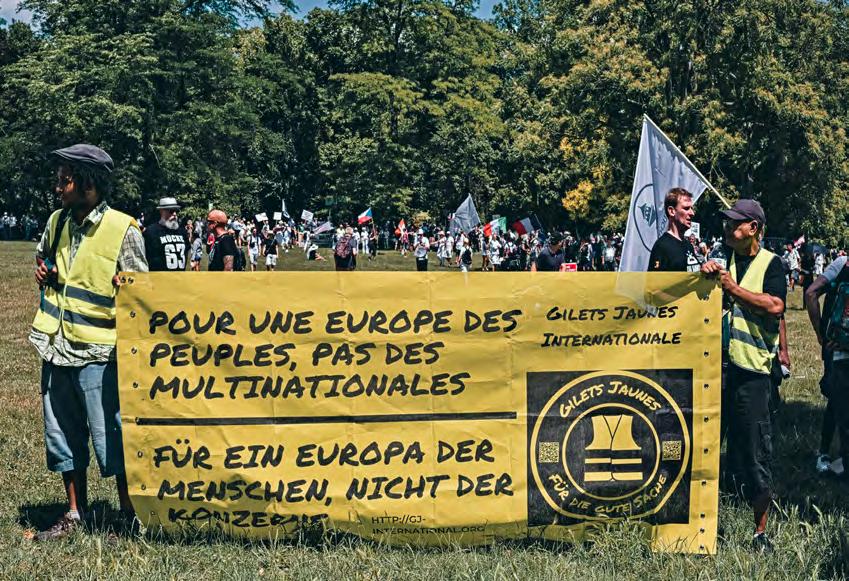
topical events, and it is important for event organisers to take advice from specialist insurance brokers. Particularly those who are in the entertainment space and understand the landscape and issues these industries face.
Be sure that they have access to markets like Lloyd’s of London, where a ready supply of insurance providers with experience and competitive outlooks will likely be able to offer the best chance of terms and conditions coupled with investable pricing.
Many businesses buy business interruption, event cancellation, and non-appearance insurances. However, these policies will often exclude these political and terrorism perils.
The cost implication from claims is huge, but thankfully, the marketplace for such coverage remains relatively competitive. Such policies can provide coverage against losses incurred due to political violence, strikes, riots, and civil disturbances, as well as war and terrorism perils.
By investing time with a broker, your event management planning can add a layer of analysis and risk management around these potential implications, thereby helping organisers to protect their financial interests and ensure a safer environment for their attendees.
Recent high-profile cases include Taylor Swift having to pull three shows in Vienna last summer following terrorist threats; Coldplay facing opposition from conservative Muslims in Malaysia over a show in 2023; and Mylène Farmer having to cancel two shows at Stade de France in summer 2023 due to riots in the French capital. These examples have highlighted the importance of considering these matters carefully.
■ Political risks cover.
■ Contingency insurance with strikes, riots, and civil commotion “extensions” to coverage.
■ War and terrorism cover.
■ What business interruption coverage exists in your property insurance.
■ Kidnap and ransom cover and/or business travel cover.
As the world becomes increasingly volatile, the importance of understanding the implications of political unrest, violence, and civil commotion cannot be overstated. By recognising these threats and taking proactive measures, event organisers can navigate the complexities of today’s political landscape while safeguarding their events against potential disruptions.
Matthew Meredith is founder/CEO of LMP Group, a specialist insurance broker to the entertainment sector, with a 25-year+ career in insurance and risk, including eight years as director of risk management (international) for Live Nation Entertainment.
LMP includes John Silcock, former CEO of Robertson Taylor/Tysers Live, and David Hacquin, former CFO of Live Nation Belgium. They are based in London and serve clients worldwide.
lmp-insurance.com


Paul Twomey and Will Doyle of Specialist Risk Group reveal what happens when part of an event or a festival has to be shut down, how insurance policies are affected, and why the refunding process is becoming increasingly more convoluted.
Partial losses occur when adverse weather conditions impact only certain portions of an event, such as one day of a multi-day festival or specific attractions, rather than leading to a complete shutdown.
These scenarios are common in outdoor festivals, where localised rain, high winds, or extreme heat can dampen ticket sales, delay performances, or even render certain areas unsafe for use.
This could include the following:
■ Reduced attendance: sudden rainstorms might deter walk-up attendees, even if the event continues as planned.
■ Damaged equipment: wind or hail may damage stages, tents, or lighting rigs, reducing the quality of the experience or leading to delayed schedules.
■ Disrupted programming: weather may force cancellations of specific performances or activities while allowing other parts of the event to proceed.
While such disruptions may seem manageable, they often translate to substantial financial losses for the organisers. Ticket refunds, vendor disputes, and additional logistics expenses can mount up quickly.
Traditional event cancellation insurance typically kicks in when an event cannot proceed in its entirety. However, many policies fall short in addressing partial losses. This creates a significant coverage gap, leaving organisers to shoulder the financial burden of weather-related disruptions that do not qualify as full cancellations.
Organisers need to understand the scope of their coverage and explore additional options to fill this gap. Insurance for partial losses – often referred to as “adverse weather insurance” or “weather interruption coverage” – can address this need.
Adverse weather insurance is designed to cover financial losses stemming from weather conditions that impede or disrupt an event, even if the event is not fully cancelled. Policies are typically customised to account for the specific risks associated with a particular location, time of year, and event setup.
Key elements of such policies include the following:
■ Triggering conditions: coverage is often tied to measurable weather conditions, such as a specific amount of rainfall, wind speed, or temperature thresholds. For example, coverage might activate if more than half an inch of rainfalls during the event hours.
■ Scope of coverage: these policies can cover lost ticket sales, damage to infrastructure, and additional expenses incurred to continue operations or manage delays.
■ Flexibility: organisers can tailor policies to cover highrisk aspects of the event, such as the main stage area or key revenue-generating attractions.

Partial loss coverage offers multiple advantages for event organisers, ensuring resilience and financial security in the face of unpredictable weather.
■ Financial protection: by covering losses related to reduced attendance, programme interruptions, or on-site damages, this type of insurance helps protect profit margins and reduces financial strain.
■ Vendor & stakeholder assurance: a robust insurance policy reassures vendors, performers, and sponsors that the event is prepared to manage risks effectively.
■ Enhanced reputation: the ability to adapt to adverse conditions and continue delivering a quality experience bolsters the organiser’s reputation and strengthens relationships with attendees and partners.
■ Long-term sustainability: with adequate coverage, organisers can mitigate risks that might otherwise jeopardise the viability of future events.
The three-day outdoor music festival in Barcelona experienced heavy rain in the lead up to the event in summer 2023. As a result, construction of the site was set back, making the main stage inaccessible and forcing the cancellation of headline acts. Despite this setback, the event continued for the remaining two days. Adverse weather insurance covered the ticket refunds for the first day, as well as additional costs for stage repairs and safety measures.
Located in Victoria, Australia, this 2024 outdoor music festival was shut down early due to extreme heat conditions. Despite attempts from organisers throughout the festival to alleviate the harsh conditions that come with an Australian heatwave, ultimately, the Country Fire Authority declared a fire ban and the festival closed on the Sunday night.
While adverse weather insurance offers significant benefits, there are challenges and considerations for organisers.
■ Understanding policy details: policies can be complex, with specific exclusions and requirements for documentation. For instance, coverage might not apply if the event proceeds and attendance losses are speculative rather than measurable.
■ Cost vs risk: premiums for weather-related coverage can be high, particularly for events in regions prone to extreme weather. Organisers must weigh the potential benefits against the cost.
■ Timely action: securing insurance well in advance is crucial, as policies typically exclude coverage for weather risks that are foreseeable at the time of purchase.
To make the most of partial loss coverage, event organisers should consider the following best practices:
■ Risk assessment: analyse historical weather patterns and identify specific vulnerabilities for the event.
■ Clear documentation: maintain detailed records of ticket sales, vendor agreements, and on-site expenses to facilitate claims in case of disruption.
■ Customised policies: work with specialised insurance brokers to design policies tailored to the event’s unique needs. This ensures that coverage aligns with the event’s scale, location, and risk profile.
■ Communication plan: develop a clear strategy for notifying attendees, vendors, and other stakeholders about disruptions and insurance-related processes.
Insurance brokers play a critical role in helping event organisers secure the right coverage. Brokers with expertise in the events and entertainment sector can provide valuable insights, negotiate favourable terms, and ensure that policies address the full spectrum of risks. By fostering strong relationships with underwriters and staying informed about evolving insurance products, brokers help bridge the gap between standard cancellation insurance and specialised partial loss coverage.
Adverse weather is an inevitable challenge for outdoor events but doesn't have to spell financial disaster. By investing in insurance coverage for partial losses, organisers can navigate disruptions with confidence, protect their bottom-line, and preserve the integrity of their events.
As the climate continues to become more unpredictable, this type of coverage will only become incrementally more essential for the long-term sustainability of festivals and events worldwide.
Specialist Risk Group (SRG) is a relatively new company, formed in 2019 but built on a foundation of expertise. Its team of accomplished professionals specialises in insurance for music, entertainment, media, sports, theatre, and interactive risks.
With offices in Manchester and London and backed by a rapidly expanding support office with teams in Europe and Asia, it is providing the exception to the norm.
A market-leading company covering liability, property, cancellation, and non-appearance risks, SRG offers practical solutions in a competitive landscape. SRG helps clients find savings without compromising on quality.
specialistrisk.com



Steven Howell of Howden Entertainment outlines how conversations around mental health are changing the live music business and what implications they have for insurance policies for touring artists.
Historically – and particularly before Covid – the majority of reasons for a tour or show being cancelled were to do with physical illness or injury of the artist(s) due to perform. The most common of which, for vocal acts, would be throat problems. While an insurance policy would provide cover for things such as a venue having to close at short notice or an artist getting stuck en route, the main risks are health-related.
Over many years, the insurance industry has built up data about artists’ health-related cancellations, claims, and incidents. This data is analysed and modelled by actuaries, alongside variables including age, intensity of tour, and previous health issues, to make health-related predictions for the act insured.
These data-driven calculations can even predict things such as how likely it is that an artist might die before the tour starts or have an accident that puts them out of action. Insurers can then use these predictions to more accurately price the risk.
This approach is similar to the life insurance markets and the premium weighting used when buying a policy to protect your mortgage.
From this data, underwriters have a better understanding of the likelihood of a tour being cancelled for a physical health reason. Generally, the premium charged allows the underwriters to pay the claims that arise and continue to trade profitably.
The rise of social media and the effects of the pandemic have given rise to a new threat that is now seeing more shows cancelled than physical illness and poses a great challenge to underwriters, insurance brokers and, more than anyone, the touring artists themselves.
Before social media, mental health issues were generally only talked about in private, behind closed doors, and in medical journals. They were rarely shared with strangers or fans. In today’s world, it is actively encouraged to share one’s own struggles, and many artists use their platforms to share their own mental health challenges to help normalise the conversation around this issue.
Covid had a two-pronged effect on mental healthrelated illness. The lockdowns and the plethora of conspiracy theories circulating at the time contributed to many people feeling anxiety, depression, and stress. Following the lockdowns, there were two of the most intense touring years in the history of the contemporary

live music industry. This led to more tours being cancelled due to artists’ mental health, as opposed to their physical health, than ever before. Some mental health issues also presented as physical health problems, like fatigue and exhaustion, brought on by stress or anxiety.
The issue for insurers is that there is no legacy data to help understand the likelihood of a particular mental health issue leading to a cancellation of a show.
This has led to some underwriters putting a blanket mental health exclusion on some policies. This is a bit like saying that because Dave Grohl broke his leg on tour, we are going to exclude all broken bones going forward, even though there is no correlation between breaking a leg on stage and any other accident he may have had.
This approach is naive and also terribly unfair on the artist, as it removes cover from their policy that they may need to fall back on and claim for.
The role of the broker is to understand our client's risks and to negotiate an insurance solution that will provide protection against as many of them as possible. When it comes to obtaining cover for mental health issues, there are options, but it requires 100% honesty and transparency from the artist, as well as open-minded and commercially minded underwriting.
Most people with a history of mental illness will either be on treatment or have coping mechanisms in place. In all contingency polices, there is an exclusion for pre-existing conditions. Therefore, if an artist were to stay silent about an historical or current mental health issue, this would then be excluded in the event of a claim.
With the artist’s permission, we will share their medical history (and treatment) with underwriters. That way, the underwriter is not pricing the risk in the dark. It is actually a better risk to underwrite someone with a known issue that is being treated and where we can demonstrate that they are able to continue touring. In these circumstances,
we will usually have the pre-existing condition and exclusion struck out of the policy in respect of these declared conditions, thus giving the artist full cover in case a mental health crisis leads to a cancellation.
If an artist has no history of mental illness and has never sought medical help previously or been referred to a specialist, then any new issue would be covered. If a new mental health problem led to a cancellation and a claim, then for subsequent tours, it is likely that this particular issue would be excluded.
However, if the artist received treatment and was able to evidence how this was being managed and that they can tour or perform successfully, then we would look to have the cover reinstated going forward where possible.
Looking ahead, we can predict a time when there is the same amount of historical data for mental health illnesses as there is for physical health available to the insurance industry. This will allow us to gain a better understanding of mental health challenges to artists and underwrite their risks fairly, provide the most appropriate cover for them, and help protect the touring income for all those parties that depend on it.
There is much work to be done in this space, and we all have a role to play. Different professionals in the live business can do specific things here to help:
Artists need to help themselves by accessing support when needed and sharing their mental health challenges with their insurance brokers much as they would for their physical health.
Insurance brokers need to take the time to educate management and artists as to why it is important to declare everything when buying insurance.
Insurance brokers are working with underwriters to encourage a step away from blanket exclusions for more evidence-based pricing models.
At the same time, agents need to consider tour intensity and factor in frequent breaks, keeping in mind that the requirements will differ for each artist.
A good manager understands the issues that their artists face and the coping mechanisms they need. It may be the need to take their dog on tour, have a hotel rather than a bus, have access to an on-tour therapist, be provided with a safe space or yoga session etc. All of this should be, where required, factored into the daily schedule.
While we will always be there to help when something goes wrong, insurance should be the last port of call. Mitigation and prevention are always the best cures.
Howden Entertainment is working with Point One Project to help solve the longer-term sector-wide approach to mental health issues. Howden and Point One Project also collaborate with Music Minds Matter, which offers more immediate mental health support.
howdengroup.com pointoneproject.com musicmindsmatter.org.uk

As leading specialist insurance brokers we have our fingers on the pulse of the event industry and offer rock solid protection — while you are running the show.
Freedom of Action. Well Secured.
GGW GmbH I Chilehaus B, Fischertwiete 1 I 20095 Hamburg ggw.de I entertainment@ggw.de
von R&S now operates as GGW — your usual contacts remain the same, but within the group we are even
Insurance stories typically only make the headlines when something goes terribly wrong: someone took out the wrong insurance policy; someone failed to take out any insurance policy at all; the claim on the insurance policy is being disputed and dragged through the courts.
Within the third category firmly sits the case of Metallica, a story rolling since 2021 that only reached its conclusion in March 2024, when California’s Court of Appeal rejected the band’s lawsuit against Lloyd’s of London. The band had initially been seeking $3m in losses resulting from the cancellation of six shows in South America in 2020 due to the pandemic.
The court held that Lloyd’s was not liable as its contracts contained an exclusion for any losses resulting from “communicable diseases.” The band had tried to argue that non-Covid reasons led to the cancellations, but Justice Maria Stratton batted this argument down, saying it was “absurd to think that government closures were not the result of Covid-19.”
Metallica may be one of the biggest bands to bring
this issue to court, but the bulk of the rulings on lawsuits over such Covid-related losses and cancellations have leaned in favour of the insurance companies. Even for acts with the deepest of pockets to pursue such legal action, the consensus would appear to be that, as in the rare cases where specific policies were taken out to cover communicable diseases, unless you have incredibly precise wording on everything you insured against, a payout is extremely unlikely.
On a more “standard” level, one of the dominant forms of touring and live music insurance was in the spotlight in 2024: cancellation insurance.
In April, the Texas Eclipse Festival had to cancel its final two days due to extreme weather blowing up ahead of the actual eclipse (and, therefore, the entire point of the festival). The storms were deemed so dangerous that the Texas Division of Emergency Management had to bring in state emergency response resources.
There was, as is now standard in the age of social media, lots of unfounded speculation about the decisions behind the cancellation (beyond the obviously meteorological ones), including claims it was oversold. So much so that organisers had to issue a statement. “We did not cancel for insurance money,” they insisted. “We made a hard decision to put safety first and avoid a far worse situation. Texas Eclipse Festival will take a significant financial loss.”
The refund process, and therefore the cancellation insurance around it, was complicated not only by the fact that the refunds would only apply to the affected days but also, according to organisers, that a “significant number of guests purchased using a payment plan.” With many
festivals offering payment plans for tickets, this exposes how convoluted the refund process is when not everyone has paid in full upfront and not all days of the event are affected.
July's Splendour In The Grass in Australia was also cancelled in 2024, with organisers announcing this in late March. For a variety of financial and planning reasons, festivals in many markets have been cancelled in recent years in advance of them actually taking place. Splendour In The Grass promised attendees immediate refunds, but cancellation of events, and the insurance around that, is unfortunately becoming a common occurrence in the live music business.
Taylor Swift may have had the most successful tour of 2024 by some considerable distance, with The Eras Tour breaking box office records wherever it went, but it was also subject to cancellations on her summer leg. In August, she had to pull three shows in Vienna after three individuals were arrested for, according to the BBC, “allegedly planning attacks inspired by the Islamic State group.” This saw markedly increased security at the other European shows on the tour.
Given the scale of her shows, this opened up the debate about cancellation insurance and refunds for venues, promoters, and organisers. This debate also ran into the realm of the fans. They started publicly asking if they needed to take out personal insurance against a show cancellation given that many were travelling long distances to attend as well as having to book accommodation that can be extremely costly.
Similar debates are percolating around the Oasis reunion shows in summer 2025, largely down to the incredibly fragile relations between Liam and Noel Gallagher. Given
the media hoopla around the reunion, and the push to have new angles to report on, there has been lengthy discussion about whether or not fans need to insure their travel and accommodation costs against no-shows or the tour imploding. Add in the controversy around dynamic pricing for most of the band’s UK shows and it offers a whole new set of issues around band insurance, fan insurance, and forecasting the likelihood of the shows actually happening.
A different form of cancellation hit the Tenacious D tour in Australia in July 2024 – that of social and political cancellation. During their show in Sydney, Kyle Gass made an on-stage comment about the recent assassination attempt on Donald Trump during his campaigning for the US presidency. “I was blindsided by what was said at the show,” said Jack Black, the other half of the duo. “I would never condone hate speech or encourage political violence in any form.” He immediately pulled all remaining shows by the band and said their entire future was on hold.
In markets like China, the UAE, and Singapore, there are very strict rules on what acts can and cannot sing about or say onstage. The Tenacious D incident, rare as it is, adds a whole new dimension to this, where shows can be pulled because of members disagreeing with the pronouncements of other members while onstage. In an era where certain comments can see public and social media push back, this carrying over to inter-band relations is an entirely new development. This may be the exception to the rule, but it could impact on what cancellation insurance may have to stretch to include.
Each year, multiple issues arise and the world of insurance will have to adapt to them. 2024 brought some new issues to light, and the sector as a whole will be paying close attention to how (or if) they are resolved, with insurance policies necessarily having to recalibrate to accommodate new developments here.


Ticket sales and guarantees are just part of the touring economy for musicians, with merchandise sales adding a huge bonus for superstars and being the difference between make or break for smaller acts. The team at Cast & Crew Live Entertainment explain how digital payments can play a key role in every part of a touring show.
In today’s live entertainment world, digital payments and effective money management are crucial for the success of global music tours. Whether it’s handling ticket sales, merchandise, or artist payouts, digital systems simplify processes, improve transparency, and boost efficiency.
As live events grow in scale and complexity, understanding how digital finance is transforming the touring industry is more important than ever. Here we explore how these digital tools are reshaping financial operations and creating new opportunities in the live music world.
Digital payments offer clear advantages over cash during a tour, especially for managing finances. They make it easier to track expenses, such as fuel, bus rentals, merchandise splits, and per diems.
Digital transactions also reduce the risks of cash handling, such as loss or theft, and improve record keeping, which helps with budgeting and financial reporting.
While experienced tour managers who handle cash effectively remain valuable, reducing a reliance on physical money can lead to better financial organisation on the road. (That said, some crew members still prefer cash for per diems due to the convenience of the tour lifestyle, balancing practicality with digital systems.)
Payment issues on tour can range from theft to technical problems. If money goes missing, it’s essential to figure out who is responsible – understanding if the tour manager had control over the funds or if the theft happened before it was transferred.
Technical issues, such as Wi-Fi outages that disrupt digital payments, can be handled by switching to cash or using backup payment methods like Zelle, PayPal, Venmo, or Cash App. Effective problem-solving and clear communication between the tour team and venue management are crucial to resolving these issues. Being adaptable and prepared ensures payments are processed smoothly despite the obstacles.
Advancing a touring show involves thorough planning and clear communication between the tour team and the venue. The process typically begins nine to ten months before the show, when the tour manager and venue agree on logistics, technical needs, and any additional fees, such as for merchandise or cleanup.
Aligning expectations upfront – ensuring the venue understands what the artist will bring, such as a personal mixing console, and confirming the venue’s offerings –prevents unwelcome surprises.
This early communication, often done through email, ensures that both sides are prepared, leading to a smooth performance for both the artist and the venue.
Clear communication and documentation during the booking process is fundamental here. Merchandise cuts should be clearly defined and written into the contract between the touring act’s agent and the venue. Before the show, the tour manager and venue representative should confirm all fees, including merchandise cuts and any additional charges. This ensures transparency and allows both parties to reconcile sales accurately using digital payment records.
Managing digital payments on the road can be challenging due to the many moving parts involved. Venues earn revenue not only from ticket sales but also from food, drinks, merchandise, and sometimes co-promotion agreements with promoters.
Daily touring costs for high-profile artists can be high, covering expenses such as crew, equipment, and other logistics. The money generated from shows is usually split between promoters and artists, with some artists securing a flat fee to ensure they earn a certain amount, regardless of how the event performs.
As tours grow, especially internationally, logistics become more complicated. From coordinating travel and equipment to handling setbacks like bus breakdowns, the tour manager’s role is to keep things running smoothly.
Digital payment systems help streamline these transactions, making it easier to track revenue and ensure everyone gets paid accurately and on time.
As digital tools become increasingly integrated into the touring process, data analytics play a crucial role in optimising decisions. The data generated – from ticket sales and merchandise revenue to crew expenses and travel logistics – can help managers make more informed financial choices.
By analysing past performance, tour managers can adjust pricing, fine-tune travel routes to save costs, and increase merchandise sales. Additionally, data

can improve audience engagement, helping artists and promoters make better decisions regarding pricing, marketing, and scheduling.
With real-time tracking, all aspects of the tour –from finances to fan experience – can be optimised for efficiency and profitability.
Adopting digital payment systems not only simplifies financial operations in the live music industry but also fosters greater transparency, fairness, and efficiency.
These tools help manage the complexities of international tours, ensuring that artists, venues, and promoters are paid accurately and on time. Moreover, the valuable insights provided by digital payment systems support smarter financial and logistical decisions.
As the industry evolves, integrating digital payments is key to creating a more sustainable, streamlined, and innovative future for live music, allowing everyone involved to focus on what truly matters: delivering unforgettable performances and experiences to fans around the world.
Cast & Crew Live Entertainment is part of a larger Cast & Crew family, a leading provider of payroll, HR, and production management solutions for the entertainment industry. Cast & Crew Live Entertainment is the leading provider of employer-ofrecord payroll services for tours, live entertainment, theatre, venues, festivals, music videos, and other short-form content. Its offerings include comprehensive workers’ compensation services; multi-state tax filing and compliance; unemployment claims management; year-end W-2 services; and digital onboarding and timecard solutions.
liveentertainment@castandcrew.com castandcrew.com

The division of income that arises from a tour is a complex web of payments for performance, production, crew, and so on. In addition, copyright holders may also be entitled to payments related to a tour. Kevin Offer of Hardwick & Morris explains the various types of payment.
Rights that may be payable in relation to a tour:
■ Performance: payable to songwriters and publishers for performing a song on stage.
■ Recordings : payable for recorded music played in the venue.
■ Merchandise : payable for use of name, logo, etc.
■ Stage design : payable for use of intellectual property.
■ Videos/animations : payable for use of clips used as part of a performance.
Before going on tour, an artist (or, more likely, their management) should check what rights may be connected with the tour. Performance rights should be covered within a publishing contract.
Merchandise sometimes falls within one contract covering retail and online sales as well as tour merchandise sold at gigs. If not already covered in that agreement, a separate contract covering merchandise for the tour (or even individual events) may be required. Any agreement should cover amounts payable to any intellectual property owner, such as the rights for using the name of the band/artist and/or any logo used. It should be noted that these rights may be held in a separate company or other entity.
Any rights related to stage design should be covered within agreements covering production costs.
Finally, where a video or animation is to be used, it is important to check who owns the rights for use. Permission should then be sought for use and a royalty or licence payment may be due. This could be with an agency or directly with the rightsholder depending on who owns the rights, whether it is from a library or a bespoke piece of art.
The payments to be made for use of copyrights will depend on the type of royalty.
The payments for the right to perform a song will initially be paid by the venue. Payment will either be made through the PRO network (for example, payment to PRS) or, if direct licensing is used, through a rights management

company (such as PACE). There are other articles on these alternatives within this publication.
For small venues, the payment made by the venue is likely to be a fixed amount payable per gig by the venue. For larger venues, a percentage will be applied to income from ticket sales.
Most tours will make use of a merchandising company, particularly post-Brexit where the impact of customs duties on movements of goods around Europe and local VAT obligations have increased the costs for even a small band. For larger acts, a separate merchandising company will be common practice.
When selling merchandise at a gig, a commission payment is likely to be due to the venue. This is, generally, a percentage of sales income, but in smaller venues may be a fixed charge. The merchandise company will then make a payment in accordance with the agreement with the artist. If the agreement has identified that a payment is due to a third party for use of a logo or design, this will be based on a percentage of income from sales. Alternatively, the agreement for use of a logo or design will be between the artist (or their touring entity) and the third party. A payment will then need to be made from the receipts received from the merchandising company.
Any payment for use of a video clip or animation as part of the performance should be covered by an agreement between the artist/production company and the rights owner. If the video/animation is a clip that is registered with a collection agent, payment will be similar to the performance royalty. The collection agent will then pay on to the rightsholder.
Where a music recording is used for, say, walk-on music or an agreed playlist prior to/post-performance, the recordings will fall under the PRS obligations of the venue.
Once performance royalties are paid to the PRO or through direct licensing, they will need to be paid on to the rights owners. The venue will make the payment, but without any further information, the payment will go into a general pot to be divided based on industry
statistics. In order to make sure the payment is allocated correctly, it will be important to submit a setlist setting out the songs performed. The setlist can be uploaded to the PRO (such as PRS) and will then be used to allocate royalty payments. For venues with capacity over 5,000, a registration with the Major Live Concert Service will enable royalty payments to be received more quickly.
It is important for support acts to submit a setlist as it is often possible for the performance royalty to exceed the payment they receive for the performance so it can provide a useful additional source of income.
Other payments will follow the terms of the agreement. So the rightsholder will receive a payment from whoever they have contracted with.
Payments for use of copyrights are income of the rightsholder and will be subject to tax in a similar way to other income from touring. The impact of VAT will also need to be considered.
Where the royalties relate to a tour undertaken outside the UK, withholding tax may be deducted at source. If a payment is subject to withholding tax, then it can be offset against the tax due on the royalty payment in the home country, up to a maximum of the tax due.
The large number of catalogue sales in recent years has added to the complications surrounding royalty payments related to touring. Where an artist tours after a sale of their catalogue, it will be important to consider the following:
■ Establish what has been sold and what is still owned. It is not uncommon now to split the ownership of rights. Performance rights in particular may be retained.
■ Where performance rights have been sold, it is important to consider the terms of the sale and other agreements to ensure there is no restriction on performance of songs.
■ It will be even more important to make sure accurate setlists are submitted on a timely basis. Any new owner will want to be sure that they are receiving their full entitlement to royalties.
Kevin Offer is tax partner at Hardwick & Morris, a firm of chartered accountants and business managers specialising in music and entertainment. He is a member of the International Tax Entertainment Group (ITEG) and is a regular speaker at music conferences and festivals around the world. His areas of advice include international touring and the tax position of copyright sales and exploitation.
Kevin Offer FCA, CTA Partner
Hardwick & Morris LLP + 44 (0)20 7268 0100 kevin@41gp.com hardwickandmorris.co.uk

Artist performances are rarely restricted to their own country and will often cross borders. Dr Dick Molenaar, partner at All Arts Tax Advisers and member of the Tax Law department at Erasmus University Rotterdam, works through the specifics around taxation, social security, and VAT, explaining the rates, the legislation, and all the other information that is critical for touring artists and their business teams.
Just like everyone else, performing artists have to pay income tax. But in which country? And how do they avoid double taxation? The same applies when companies are involved, which may be taxable as (or exempted from) corporation income tax. There are special tax rules for performing artists, and this chapter explains how they work, both in the country of work/performance and in the country of residence. It will show how the (European) social security rules work when performing in other countries. And finally, two VAT aspects will be explained: the VAT rates on ticket sales and the reverse charge system.
Many countries want to tax every income stream that has been earned by non-residents because they are anxious that otherwise it may not be taxed anywhere. In addition, they will want to use the tax earnings within their national budget.
For performances from visiting artists, most countries have a source withholding tax in their national legislation. The tax rate is most often lower than normal – such as 10% in Luxembourg, 15% in France, 18% in Belgium, 20% in the UK, 25% in Portugal, and 30% in both the US and Italy. At the end of this chapter, there is a table outlining how the artist withholding tax rates apply
in EU member states and some other countries.
The reason for rates that are lower than normal is because tax is calculated from the gross performance fee without deductions for expenses. This will be discussed in Deduction of Expenses on page 25.
On the other hand, countries tax the income of their residents on a worldwide basis. That means it is not only income earned in the country itself but also foreign income that is taxable in the home country. The end result is that income from foreign performances is taxed twice: first in the country of performance and then in the country of residence. The result is double taxation.
To eliminate this double taxation, countries started to develop bilateral tax treaties over a century ago. Without this, cross-border work would be very unprofitable. Tax treaties divide the taxing rights across the two relevant countries.
Most countries accept these tax treaties as stronger than national law, which means that they set aside national rules for international agreements. The OECD in Paris coordinates the bilateral tax treaties with a Model Tax Convention (plus Commentary). There are special rules for artists in this Model, in Article 17, which have been taken over in the tax treaties.
The OECD Model has the following relevant articles for the music business:
Article 7 Business profits
Article 12 Royalties
Article 15 Income from employment
Article 17 Entertainers and sportspersons
Article 23 Elimination of double taxation
With Article 7, countries agree how the taxing right for business profits (companies and self-employed) will be divided. The main rule is that these profits are only taxable in the country of residence, which means that the source country cannot raise any tax, unless there is a permanent establishment (PE) in the source country, because then the profits of this PE are also taxable in that other country. A PE normally comes into existence after more than 12 months. An independent agency does not create a PE.
With Article 12, a separate rule has been created for royalties and allocates the taxing right solely to the residence country of the beneficial owner of the royalties, although it also allows source countries to tax the royalties at a low percentage, such as 5%, 10%, or 15%. Some countries use this exception, for example Italy, Japan, and Portugal.
With Article 15, income from employment becomes essentially taxable in the country of residence, except when the work is done in the other country. There is a major exception in Article 15(2) for employees working for their employer in the other country because then the taxing right remains in the country of the employer if the work period is less than 183 days.
With Article 17, a special taxing rule has been created for entertainers (and sportspersons), allocating the taxing right to the country of the work, regardless of
whether they are self-employed or an employee. This is also the case when the fee is not directly paid to the entertainer or sportsperson but to another, such as an agent, management, or other company.
With Article 23, double taxes should be eliminated. The residence country will also tax the foreign income as part of the worldwide income but has to allow a foreign tax credit (or a foreign income exemption) to prevent the double taxation.
The special Article 17 for performing artists in the OECD Model makes foreign performances complicated. The article has been taken over in almost every bilateral tax treaty and is meant to counteract tax avoidance behaviour by top artists and sportspersons who have moved their residence to tax havens, such as Monaco. Examples are Andrea Bocelli and Luciano Pavarotti, and sporting personalities Boris Becker, Steffi Graf, Tom Boonen, and Max Verstappen. Monaco does not have an income tax rate, only VAT.
It is unclear why a tax treaty provision would be needed to tax these top stars. Monaco does not have tax treaties, so is not affected by an Article 17 in, for example, a tax treaty between Germany and the UK. It would be enough if every country left its national withholding tax in place for artists, sportspersons, and others with Monaco as their country of residence.
In 2014, the OECD also provided other reasons for Article 17, such as the country of residence having problems with obtaining information about foreign income and that source taxation can easily be administered.
Article 17 is a catch-all provision, because the country of the performance has the taxing right for any
income arising from the performance, regardless of who is being paid – the artist themselves or another party. This can be an agent, management, a theatre or dance company, orchestra, or the personal company of the artist themselves.
Initially, the deduction of expenses was not recognised in the bilateral tax treaties. Most countries decided to raise a relatively low artist withholding tax rate, which is taken from the gross fee without any deductions. As mentioned in the National Artist Tax Rules on page 24, 10% in Luxembourg, 15% in France, 18% in Belgium, 20% in the UK, 25% in Portugal, and 30% in both the US and Italy. The end of this chapter provides an overview with the artist withholding tax rates applying in the EU member states and some other countries.
Expenses can be deducted in advance in the UK, the US, and Australia so that the tax is only raised on the actual profit. The UK has the Foreign Entertainers Unit (FEU), the US has the Central Withholding Agreement (CWA), and Australia has the Foreign Resident Withholding Variance (FRWV). In some countries, income tax returns can be filed at the end of the year to allow for the deduction of expenses.
EU member states were forced to allow the deduction of expenses after the Gerritse and Scorpio decisions of the European Court of Justice (ECJ) in 2003 and 2006. Every EU member state had to follow these decisions and change its legislation so that expenses become deductible and tax returns possible. Nowadays, only some states (such as Portugal and Italy) have failed to comply and continue to tax gross income.
It is unfortunate that every EU member state has a different system for the deduction of expenses and that very often procedures will differ from region to region. In
some countries, the system can depend on the promoter.
Very often separate production companies are used to split off the expenses from the artist fee. Payments to these separate productions should not fall under the artist withholding tax, according to the Article 17 OECD Model and the national tax rules. But very often there are percentage limits to production expenses.
Direct invoicing to the promoter in the country of the performance of agency fees, travel, hotels, and other production expenses will lead to a lower taxable artist fee and withholding tax.
Altogether, the deduction of expenses is complicated because it has to be arranged per country, and sometimes expenses have to be incurred to hire tax lawyers for consultancy and applications. Smaller and medium-sized artists therefore may have problems with arranging the deduction of their expenses.
The table on page 28 shows whether or not countries allow the deduction of expenses before the performance and/or the filing of an income tax return at the end of the year.
As the residence country wants to tax the worldwide income of the performing artist, it has to allow a tax credit for the tax withheld abroad. This is described in Article 23 OECD Model (and the bilateral tax treaties). Some countries (such as Belgium) allow the exemption method to eliminate double taxation.
The tax credit is most often an ordinary tax credit, which means that the foreign tax can be deducted from the tax in the residence country but only to the amount of tax due on the foreign income. This limitation avoids the fact that the residence country has to give more credit than it levies from the foreign income. Some countries allow excess tax credits to be carried forward to the next year.
■ A UK artist has earned €3,000 in Germany, which was taxed at 15.825% = €475 in German tax.
■ In the UK, they had to deduct their expenses of €2,000, which means that their net profit was €1,000.
■ Their total UK income was €40,000, from which they paid €6,000 in UK tax.
■ They claimed a foreign tax credit of €475, but the limit of the ordinary tax credit was €1,000 / 40,000 = 2.5% x €6,000 tax = €150 maximum credit.
■ This leaves an excess tax credit of €150–€475 = -€325.
■ Without carrying forward to the following year, this would mean a net loss for the UK artist.
Some countries (such as Belgium) are using the exemption method and then the income is completely taken out of the taxable base. But the result will be the same in the previous example because the exemption method is the same as the ordinary credit. This means that partial double taxation still frequently occurs. For the tax credit method, tax certificates are needed
to prove that tax has been withheld in the foreign country. Plus, these tax certificates have to be in the name of the artist who wants to claim the tax credit. The exemption method can be applied without this evidence, but most countries follow the OECD recommendation to use the tax credit method for Article 17 income.
When expenses can be deducted in the country of the performance, the artist withholding tax will be lower, and the risk of double taxation will decrease. But when the artist tax is raised from the gross fee, (partial) double taxation most often occurs.
The special Article 17 for entertainers (and sportspersons) often leads to tax credit problems. Not only for a small artist, as in the example above, but also for more established artists. High production expenses, missing tax certificates, and the use of personal companies are most often the reasons for lower tax credits than what has been withheld abroad.
The options to deduct expenses abroad are most often only accessible when hiring a local accountant or tax adviser. This leads to extra costs, which are often unaffordable. Also, for obtaining the foreign tax credit in the country of residence, the assistance of an expert is needed, which brings with it extra expenses.
It would be much easier if Article 17 and the artist withholding tax did not exist but the norms of Article 7 (Business Profits) or Article 15 (Employment) could be followed. There are best practice examples in Europe.
Some countries do not have an artist withholding tax in their national tax law, such as Denmark, Hungary, Ireland, and the Netherlands.
Belgium and the Netherlands have not included an Article 17 for entertainers and sportspersons in their new bilateral tax treaty.
The tax problems for small- and medium-sized artists were behind the US inserting a minimum threshold in its bilateral tax treaties. In the first US Model Tax Convention of 1996, the minimum was set at $20,000 gross per person per year, which meant that the US tax treaty policy from then onwards was to set the threshold on that level in later tax treaties. This has happened in the treaties with Denmark (2000), the UK (2001), Belgium (2006), and others.
In the latest 2016 US Model Tax Convention, the minimum was raised to $30,000 gross per person per year, which is now the standard for new US tax treaties.
The OECD Model also allows a minimum threshold of around €20,000 per person per year in its Commentary on Article 17. But this recommendation has rarely been used by countries in their bilateral tax treaties.
Some countries have minimum thresholds in their national tax law, such as Belgium with €400 per artist per performance and Germany with €250 per artist per performance, while the UK applies the yearly general allowance of £12,000 profit to non-resident artists. This shows that it is possible for countries to allow unilaterally minimum thresholds to visiting performing artists.
A minimum threshold can be a good alternative when countries still want to use the artist withholding tax from Article 17 OECD Model but take away the negative results for the smaller and medium-sized artists. But it is important, then, that it can be applied directly at the performance and not just after the year in a refund procedure.
The table on page 28 shows which threshold has been agreed with the US for every country. This threshold is per performing artist per year.
Social security contributions can also be an extra burden for international performing artists. Different from taxation is the fact that social security also creates rights for health insurance, unemployment and disability benefits, as well as pensions. The national social security institutes need information about social security and contributions to be able to grant the benefits, so that they can also grant the benefits on time and for the correct amounts.
Therefore, within the European Union, social security has been harmonised with the EU Regulation 883/2004. This states in Article 13 that an EU resident can only fall under the social security of one EU member state. This is normally the state of work; but with work in more than one EU state, the social security of the residence state applies, and the other state(s) should allow an exemption.
After Brexit, the UK agreed with the EU to remain within the framework of the social security system, and the EU regulation also still applies to UK persons.
This means that international performing artists normally only fall under the social security of their residence state and do not have to pay social security contributions in other countries.
The EU has created the A1 certificate to ascertain the applicable state of social security of a person. Every EU state has a social security institute issuing A1 certificates on request for its residents.
Some states also need A1 certificates for the crew of a touring band.
Unfortunately, Germany keeps levying social security contributions (Künstlersozialversicherung) from nonresident artists (or their companies) against the EU Regulation 883/2004.
The table on page 28 shows whether countries ask for an A1 certificate to be exempted for social security contributions.
VAT is an indirect taxation that focuses on the expenses of consumers. They don’t pay the tax themselves but it is levied from the companies selling goods and services to them. Companies also charge VAT to each other, but this can be deducted as input tax, leading to goods and services being free from VAT until they reach the final consumer.
Across the border, no VAT is charged between companies with the reverse charge system.
The VAT has been harmonised within the European Union with the VAT Directive 2006/112/EU, after which every EU member state has to use the same VAT rules. But some aspects are optional, such as the level of the normal VAT rate and the use of optional low VAT rates, such as for cultural services.
The normal VAT rate ranges from 17% in Luxembourg to 27% in Hungary.
Most EU states use a low VAT rate for ticket sales for artistic performances and this ranges from 3% in Luxembourg to 18% in Hungary.
Dr Dick Molenaar is a tax adviser for many Dutch and international artists, sports personalities, companies, and institutions. He is a partner with All Arts Tax Advisers in Rotterdam, the Netherlands.
He is also the author of Taxation of International Performing Artistes and many articles and books in the Netherlands and abroad.
He is a member of the Nederlandse Orde van Belastingadviseurs (NOB), the International Fiscal Association (IFA), the International Tax Entertainment Group (ITEG), the Association for Electronic Music (AFEM), the International Association for Music Agents (IAMA), and the International Association of Entertainment Lawyers (IAEL).
allarts.nl
The table below shows the applicable VAT rates per country (in the two right-hand columns).
1
2 Italy:
3
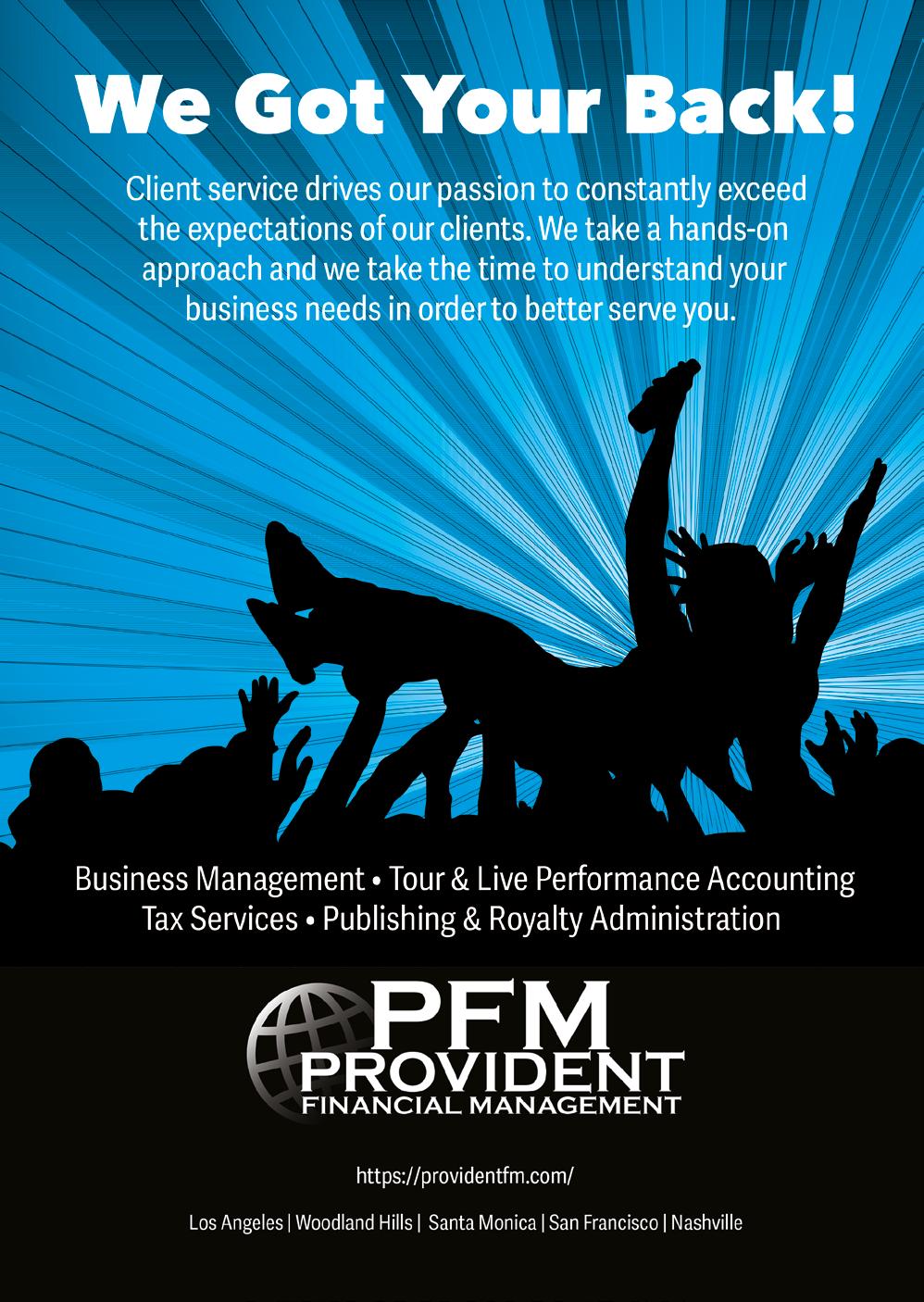
One of the biggest live music stories of 2024 in the UK is not about taxation in hard accountancy terms per se, but it is a form of cultural taxation. After several years of lobbying from the Music Venue Trust (MVT) for larger venues to economically support grassroots music venues in the UK, a breakthrough arrived in November where the UK government publicly supported a move for £1 from each ticket sale for arena and stadium shows to be paid to a central fund.
In 2023, Enter Shikari got things moving when they announced they would donate £1 from every ticket sold for their 2024 UK arena tour to the Pipeline Investment Fund set up by MVT. Then, in September 2024, Coldplay committed to donating 10% of proceeds from eight UK stadium shows in 2025 to MVT.
Sam Fender pledged £1 per ticket from his December UK arena shows to the cause, and Katy Perry, the first
major non-UK artist to get involved, made a similar commitment for her 2025 UK arena tour.
At the time of writing, the UK government’s stance is that it wants larger venues to work on a voluntary basis here in line with the Culture, Media & Sport Select Committee’s recommendations (all arising from its earlier report on the state of grassroots venues).
How this is adopted by the live industry as a whole remains to be seen, but if it falls short of the Culture, Media & Sport Select Committee’s expectations, it could shift from a voluntary levy to a compulsory one.
Inevitably it has been termed the “Taylor Swift tax” by the popular media in order to make a complex process
“Ministers have made clear that they want to see a voluntary levy come into effect as soon as possible for concerts in 2025, with clear communication to fans on the purpose of the levy and the benefits it will bring to the grassroots sector. The government will consider the implementation and effectiveness of a voluntary levy before determining whether further action is needed.”
UK Government

Enter Shikari at MVT’s Venues Day 2023
© Georgia Penny / MVT
more digestible for a non-industry audience. The hope is that this proves to be a pioneering “success tax” on the biggest acts to help ensure the health and future viability of the entire live venue ecosystem where acts can develop their craft and where some (but not all, as not all acts want, or will have, that kind of career) will become the arena and stadium acts of the future.
Around the world, different taxation issues were impacting the live business in characteristically different ways.
Down under, there are growing calls to echo what is happening in the UK with regard to bigger venues being “taxed” in order to help smaller venues. In October 2024, collection society APRA AMCOS called for the Australian government to put in place a live music tax system that would see money funnelled into helping grassroots venues. This followed the commissioning of a report into the state of the live music business in the country to assist the live music sector return to growth after the painful impact of venue closures during the pandemic.
APRA AMCOS CEO Dean Ormston said in a statement, “A tax offset to support the growth of live music would not only be a catalyst for the social and cultural development of live music but would also provide an injection of confidence across the tourism and hospitality economy.”
In April 2024, there was a breakthrough in this area in Tennessee, USA, when the state passed legislation that would establish a fund to support live music venues, specifically to help them recover from lockdown during the pandemic as well as protect them from sharply rising real estate and running costs.
In Ecuador, the country is hoping to attract foreign touring artists to the country and build up its international standing in live music through the introduction of a 10% tax reduction applied via its new Tourism Law.
South American promoter CKConcerts told IQ in July 2024 that the revised regulations will enable it to take advantage of a lower tax withholding of 15%, compared to the previous 25%, when paying foreign artists who perform in Ecuador.
Thailand is moving along similar lines, with the government’s Board of Investment introducing a tax waiver for the organisers of shows in the country by major international acts. The goal is to draw more foreign acts to the country and increase its standing as a tourism destination.
Organisers who invest 100m baht (around £2.3m) in events and shows will be exempt from import duties on equipment and the visa processes for visitors involved in the shows will be streamlined. The hope is these tax breaks will make shows by foreign acts easier to organise and, as such, increase the number of them each year.
The inverse of what is happening in Thailand is possibly going to happen in Indonesia. The Indonesian government is considering the introduction of an excise tax on concert tickets (as well as other goods such as fast-food and
smartphones). In July 2024, however, Sandiaga Uno, the country’s minister of tourism and creative economy, broke with the government line on this and suggested that such a scheme would undermine his goals of growing tourist numbers in Indonesia.
Nirwala Dwi Heriyanto, director of communication and guidance for customs service users, stated, however, that excise taxes extending beyond ethyl alcohol, alcoholic beverages, and tobacco and into new areas was still only at the consideration stage. “It has not been studied yet,” he said in a statement, later published by Tempo.co. “[We are open] to suggestions from academics and other stakeholders.”
All the moves across the world show how important live music is to a nation’s economy and its culture, but they also reveal just how precarious the live business is.
Especially for developing or secondary markets, tax breaks to attract major names to play in the country can have profound financial benefits; but equally, live operators in mature markets where taxes are increased argue it will damage the overall live sector. Cutting through the middle of this is a growing movement to have a small “success tax” applied only to the biggest acts and venues that will go to support the smallest venues.
The push-pull of tax laws will continue, and caught in the middle, the live business will call for changes that can grow the sector in aggregate rather than put any future growth at risk.

Touring for most acts today is a truly international operation, especially as more markets and regions are opening up. Careful and strategic planning around taxation –how much is due to be paid and in which countries – is essential. Steve Wren from SRLV explains the key principles and dosdos and don’’ts of withholding tax, as well as highlighting the latest issues.
Local withholding tax can be a complex area to navigate. Without the right advance preparation and advice, it is easy to make mistakes which that can expose artists to significantly higher tax charges.
For me, there are three main reasons why this cost should be taken seriously:
■ Withholding tax is a significant cost that artists incur at the time of their shows and needs to be planned for as part of preparing tour budgets and cashflow forecasts.;
■ Jurisdictions such as the UK and US have even legislated that claimants must have reduced their withholding tax as much as “reasonably” possible, to offset it fully.;
■ The tax affairs of celebrities often make the headlines for the wrong reasons. So whilst mitigating tax costs as much as possible, artists and their advisers should always be mindful of adhering to compliance requirements.
The costs of touring for artists and putting on shows for smaller venues has received significant coverage over the past year, and quite rightly so.
For smaller artists, the level of withholding tax hit the headlines in IQ recently, with non-US artists looking enviously at the $20,000 de minimus contained within the majority of tax treaties the US has with other countries, which allow most small US acts to avoid the withholding tax cost of touring.
However, for US artists this de minimus is not always applied automatically and may need to be claimed; hence, it could still be a cashflow cost, with a possible repayment later. The UK does operate an administrative de minimus for foreign artist withholding tax linked to the personal allowance (£12,570), but there are limitations to its operation, and it is not an exemption; it is simply for administration purposes and once exceeded, the whole amount is taxable.
Ideally, the UK and other countries would bow to pressure and include withholding tax exemptions or limit its scope. Changing international tax treaties takes years, so the onus is on local jurisdictions to implement local
laws to effect change.
Interestingly, there are some contradictory rules when it comes to tax in the UK. Whilst there are significant tax incentives for industries including TV and film (via a tax credits system), no government incentives apply to the music touring industry.
I am often asked to comment on withholding tax matters within show contracts and it is obviously important to establish the parties’ obligations in this regard.
An area that usually prompts a lot of discussion is the “net deal.”. This is where the promoter offers an amount, net of taxes. Sometimes this is used where no withholding taxes are applied, such as Ireland, Denmark, and the Netherlands.
Outside of these, withholding taxes will be applicable, so advisers need to know the amount of taxes an artist will be liable for (to reach the net) and also receive backup documentation, should an artist’s home tax authority want to substantiate the amount being claimed as a credit against home taxation.
Failure to understand or pin down the local withholding tax amount in any “net deal” can result in an artist having a higher overall tax burden than would otherwise arise.
How does withholding tax generally operate and & are there any changes in approach?
Withholding tax can operate very differently from country to country. Some jurisdictions do not withhold, some use a tax on net profit basis (subject to an application process), whereas most of Europe and South America tax the gross income the artist will receive but at a supposed lower rate (perhaps with contract splits).
Filing withholding tax applications on time continues to be the key for the countries operating on a net basis. Failing to do this can cause havoc with tour cashflow. Whilst any overpayment can be reclaimed on filing a tax return, this may not be allowed until long after the tour has finished and many months after vendors will want to be paid.
As far as changes in approach, we are seeing differences between promoters in France and Spain regarding contract splits and the need to provide back-up documentation. Whilst having documents to support your expenditure is clearly the preferential route, we have seen some Spanish promoters requiring the artist entity to provide an indemnity to them (should the tax authorities view that more withholding tax is owed and go after the promoter).
South America has been a high withholding tax jurisdiction for some time, to the extent that some of our clients are questioning even going there. Whilst withholding mitigation is limited, there is increased speculation that Brazil’s desire to fully join the OECD (Organisation for Economic Cooperation & Development) may result in a loosening of the withholding tax burden (25% on gross), which would be very welcome.
Generally, local tax authorities do not care how urgent a request for a Certificate of Tax Residence/ Social Security
form or other form/certification is. It simply joins a pile and is dealt with when they get to it.
The application process to obtain this documentation can be very lengthy, particularly when dealing with public offices. I cannot stress enough that, if this documentation is needed, then it is vital to start applications early to ensure that everything runs smoothly with the local promoter. Whilst there were understandable delays following Covid, we are not seeing any discernible improvement in turnaround times, albeit online applications (where possible) do seem quicker.
The relocation of the UK Foreign Entertainers Unit (FEU) from Liverpool to Manchester has meant a loss of experienced personnel, with lengthy delays in agreeing applications for foreign artists and additional scrutiny over expenses.
The entity type determines how the applicable foreign tax can be offset against an artist’s UK tax bill. Whilst UK Limited Liability Partnerships (LLPs) are widely used, with the recent increase in Corporation Tax to 25%, there may be advantages to using a UK Limited Company for certain territories. This has come to the fore in Canada where there is comment locally regarding limited liability protection, coupled with the fact that the withholding tax rate on net profits matches the UK corporation tax rate.
In some instances, the type of entity used can cause issues in the foreign jurisdiction. For example, the use of a UK LLP is not advisable if an artist is performing a show in Thailand, due to local laws and a very unsupportive UK/ Thailand tax treaty.
It continues to be advisable not to use an unlimited liability vehicle, as well as ensuring that artist touring entities are separate from any other trading vehicle that artists have; particularly one in which they hold valuable recording and publishing rights.
This is sometimes overlooked, but after each show/tour, it is vital to ensure you hold all relevant documentation required to support withholding tax claims back home.
Despite mitigating withholding taxes at the time of the shows (or in advance), some jurisdictions will still usually require a subsequent tax return filing by the stage performer/s, such as the US, Australia, and France. Indeed, the ability to file advance withholding applications in the US requires your performers to have been compliant in their US tax affairs and filing end of year tax returns for prior tours.
Whilst it is useful to understand the basics, it is advisable for artists and managers to engage a withholding tax specialist, given the complexities and that every tour is unique. The key is to start early and have an open dialogue with promoters and the artist representatives.
■ Engage with those preparing tour budgets and cashflow forecasts at an early stage (if that is n ot you).
■ Start a dialogue with the local show promoters well in advance, but do not be afraid to question it.
■ Understand the show contract and what the parties’ obligations are.
■ Be sure to understand exactly what is required from a withholding tax aspect and what you can/ cannot do.
■ Where direct invoicing will be needed, speak to production suppliers about your requirements in advance.
■ If you need documents from an artist’s tax authority (such as a certificate of tax residence or social security documentation), it is advisable to make the request as far in advance as possible.
■ If local advisers are necessary to file applications (US and Australia, for example) engage with them well in advance of the show to obtain quotes for their services and relevant timelines.
■ Follow through the planning and ensure it stays on track.
■ Do not forget to gather all relevant documentation and ensure any subsequent tax filings are submitted on time.
Steve Wren is a tax partner at SRLV, one of the UK’s top three accountancy and business advisers to the music industry. Voted in consecutive years as one of Billboard’s Top Business Managers, he has specialised in the taxation of entertainment clients since 1992 and advised touring artists, from independents to household names, on a regular basis for more than 15 years.
Alongside UK musicians and international acts, Steve and his team regularly advise promoters and agents across a range of tax matters, including more specialist areas, such as withholding tax.
steven.wren@srlv.co.uk
+44 (0) 207 079 8888 www.srlv.co.uk

Many touring artists have been caught off guard by the statutory 30% withholding tax in the US and the 15% statutory withholding tax in Canada. It is possible, however, to mitigate these withholdings with advance planning. Robert Baird from BAM! breaks it down.
Anyone (such as a promoter, venue, presenter, manager, agent) making a payment (and therefore becoming a withholding agent) to a foreign artist (non-resident alien) for services performed in the US, other than in the course of regular and continuous employment, is required to withhold 30% of the artist’s gross income and remit it directly to the Internal Revenue Service (IRS).
Gross income includes deposits, advances, fees, commissions, and settlements, as well as expense reimbursements (with certain exceptions). In short, this covers all compensation to the artist.
Anyone who has to determine whether or not to withhold tax needs to understand the difference between individuals and businesses as the IRS sees it. A solo foreign artist contracted for a performance will be treated as an individual and subject to withholding tax. If a performing group is unincorporated, then the members of the group will be considered individuals and withholding tax rules will apply. If the artist or group of artists is incorporated and do not participate in the profits of the corporation (i.e. they are paid a set fee or salary for their work), then they will be regarded as a business and can claim the withholding tax exemption for businesses.
Withholding can be reduced through:
■ Tax treaty exemptions for individuals or an IRS Central Withholding Agreement (CWA).
■ Tax treaty exemptions for businesses, including nonprofit organisations.
Tax treaty exemptions can allow a foreign artist to earn a certain amount tax-free, depending on their country’s treaty with the US.
A Central Withholding Agreement (CWA) is a process whereby an individual foreign artist can enter into a tax withholding agreement with the IRS to reduce the 30% withholding, provided that the artist is in compliance for all required Federal Income Tax returns and payment obligations. A CWA requires a withholding agent and assessment of the net tax liability (income-expenses) to determine the withholding percentage. Only certain expenses are allowed here.
Most tax treaties contain an article on business profits, which can exempt a business from any tax liability in the US, provided that the business has no “permanent establishment” (such as a branch office) in the US.
Foreign non-profits are not considered non-profit in
Robert Baird is president of BAM! Baird Artists Management Consulting and an acknowledged expert in international touring, including visas, withholding, and taxation. He is former president of NAPAMA (North American Performing Arts Managers and Agents), past-president of OAPN (Ohio Arts Professionals Network), and served as APAP’s showcase coordinator. He is currently board treasurer of The King’s Singers Global Foundation and a withholding and acceptance agent for the IRS. He is well known for his columns on “Crossing Borders” in International Musician and IFEA’s “ie” magazine.
robert@bairdartists.com bairdartists.com
the US – unless they register with the IRS.
The withholding tax procedure requires an Electronic Federal Tax Payment System account, so many venues and artists appoint a withholding agent.
A foreign artist is required to file a US tax return (usually a 1040NR), to report the US income. Businesses can file an 1120F tax return.
Certain states apply state withholding tax in addition to the statutory 30% federal withholding. Some of these states have a waiver process to reduce or eliminate the withholding tax.
Note that foreign artists may also be subject to state and local income taxes for income earned in that state, as well as tax on merchandise sold.
In Canada, the withholding tax rate is lower than in the US, but there are a multitude of issues to be aware of, and to prepare for, when touring here.
Every payer, including a non-resident payer, who makes a payment to a non-resident of Canada (individuals or businesses) for services provided in Canada, other than
for regular and continuous employment, must withhold and remit 15% of the gross amount paid to Revenue Canada.
The only alternative to the statutory withholding is for the non-resident, either an individual or a business, to obtain a waiver or a reduction in the withholding tax.
A treaty-based waiver can be submitted by a nonresident of a country with whom Canada has a tax treaty and who earns less than $5k. Waivers can also be obtained based on income and certain expenses.
A corporation needs a business number (BN) to complete an R105 Waiver; an individual needs an individual tax number (ITN). The ITN process requires original passport certification by specific professionals.
Non-residents who have carried on business in Canada must file a Canadian income tax return, either a T-1 return for individuals or a T-2 return for businesses. There is a stiff penalty for failing to file.
Additional withholding of 9% of payments made to non-resident artists is required by the Province of Quebec for services rendered in that province. Non-resident individuals and businesses can apply for a waiver of the 9% Quebec withholding tax.


A business manager’s role can be vital in ensuring that a tour operates successfully and profitably, with the business manager offering integral input across a number of key touring areas.
Scott Dunnachie and Mark Carter of Prager Metis LLP share ways in which business managers can positively impact touring income and administration, from working on withholding tax mitigation and business structures, right through to cash flow and problem solving.
A key way in which a business manager can improve your touring business is by looking at the optimum structure for the artist at their current level, from both a tax perspective and a commercial perspective. Up-andcoming artists will require a different structure from that of a more prominent, more established artist, who would likely need different business structures for different territories.
An artist going to the US may want to have an Inc. or equivalent to give them extra protection, as the US can be quite litigious. For other foreign territories, it could be a case of setting up an LLP, allowing artists to maximise the withholding tax credits. And for UK touring, that structure
would likely come in the shape of a limited company. An artist coming to the UK would be under an FEU (Foreign Entertainers Unit), in order to get a reduction in the rate of Foreign Entertainers Tax paid on any UK earnings.
At a certain career level, it can be a good idea to ensure that a touring entity is separate from the artist’s other trades, for example, the entity that owns the copyright. If something were to go wrong on tour, that company would then suffer any financial losses, or get sued, removing the chance of any impact on the copyrights, which is potentially a very valuable asset that you don’t want to lose or impair.
From a practical point of view, it can make sense to have a single entity for all of a tour’s activity, whether that’s an LLP or limited company. The setup of this would be dependent on the individual artists, financial planning, their goals, their size, the stage of their career, and so on. All of these factors are important in bespoke structure planning for each client, as one size does not fit all.
Working with artists, their manager, TM, etc. from early on in the budgeting phase is essential for business managers, as it allows us to build a realistic cash flow projection that takes into consideration the peaks and troughs of the touring schedule and associated income and expenditure.
In terms of cash flow, it's likely that no cash will be received until numerous expenses have already been incurred. In the early stages of a tour, there are rehearsals, setup/production costs, etc. – so how is that funded? Is the touring entity keeping back an amount of money for future tours? Or is the funding from another source, such as copyright income? Business managers can advise on the best ways to handle cash flow and secure funding when building out a tour. A source of funding could be banks or bespoke lenders, and a development that we’re seeing is lenders looking at loaning against catalogues or providing finance against the future income of catalogues and touring. A lot of banks and specialist lenders come to business managers in the first instance to tell us what’s available in their market, rather than going to the manager or the label – that’s why we’re an important part of the ecosystem, because we’re seen as the finance function. Other ways that business managers can work with income and cash flow are looking into options such as label tour support, merchandise advances, endorsements, or sponsorships.
Business managers can have conversations with promoters to advance funds or even release funds on a more regular basis throughout a tour. There can also be agreements made around promoters paying costs and suppliers at source, which helps in some territories with withholding tax and also helps with the artist’s cash flow. It’s important to consider cash flow on a show-by-show basis, as some shows might not be profitable – or perhaps loss-making – so it’s key to make sure that’s not causing a cash flow problem for the artist at any point.
The earlier these discussions can begin, the more time there is to find solutions such as funding advances and working out how to mitigate or reduce withholding tax.
Withholding tax mitigation involves working with other territories to file reduced rate applications: in the US, that would be a Central Withholding Agreement (CWA); in the UK, it would be an FEU. Belgium and Australia also have similar filing processes.
We work with lawyers and accountants in those territories to get these filings completed. We provide them with the relevant information, and we work with them throughout the entire process to reduce withholding tax as much as possible.
A lot of these processes are done through collaboration. An artist or manager may not know somebody in the US, Belgium, or Australia who can provide these services, but business managers have a large book of contacts and know what information is needed. With time and early collaboration, and in some territories the filing needs to happen in advance of the tour, we can make sure that everything is addressed in good time to ensure that the tour can happen as profitably as possible.
In terms of other withholding tax mitigation strategies, we can look into splitting contracts between artists and production companies. We encourage promoters to pay certain suppliers at source. We’ll also look into social security. In the likes of France and Italy, this would include having A1 documents in place so that those territories don’t start taking social security deductions from income.
We work with a host of third parties, including tour managers, artist managers, tour accountants, promoters, booking agents, suppliers, lawyers, currency management, bankers, and insurers. A large part of our role is bringing all of these strands together into a cohesive plan or strategy for the tour, being a conductor for the orchestra, as it were.
We see tours hitting all the major territories. We have experience on costs such as hotels, travel, buses, transport, etc. Reviewing these costs gives us a view on where things have been over- or undercooked, and we can identify issues when there’s still time to find solutions. It gives the artist and their team time and scope to see if anything needs to be added or cut in order to maximise profits.
We advise clients to scenario plan, especially if they are planning a large tour. We discuss risk analysis and strategise profit margins to create solutions for questions, such as, what happens if a particular show is cancelled? It might not matter if it’s one of the smaller shows, but what if it’s your most profitable show? We’ve seen it happen where a band is out on tour and all of a sudden, one of the big festival slots doesn’t happen, and it affects the tour’s profitability. Scenario planning can make people aware of potential issues, and it’s beneficial to undertake this kind of risk analysis to identify areas that could be problematic. An example is working with the touring team to put cancellation insurance in place to mitigate risks.
We’re there to support all of the artist or manager’s needs at any time during the tour. Whether it’s being a reliable confidant, a trusted advisor, or offering commercial advice, our role is to problem solve and to think outside of the box. We constantly encounter problems around tours, and often, we’ve got a solution on tap. We will troubleshoot and find solutions to resolve any issues – plate spinning and on-the-spot thinking is a huge part of our job.
Dynamic pricing is a hot topic at the moment, and we look forward to engaging in discussions with artists and management to help them shape an informed perspective. While there has been some negative publicity recently, our goal is to ensure our clients are well-positioned to navigate the conversation effectively.
Established artists are seeing incredible profits, partly due to ticket prices at bigger venues and stadiums, whereas smaller artists are really struggling and, in a lot of cases, touring at a loss, which makes it difficult for them to progress their careers to the next level. Many are being priced out of doing this for a living.
MERCHANDISE
Merch can be a big source of income for up-and-coming artists, so we can look into ways of maximising profits. Whether that’s the artist producing their own merch, selling merch at concession stands, or hiring an agency to help with merch sales. There are pros and cons to each option – there can be higher margins if you do it yourself but more admin and tax compliance. We can help explore the best options.
The golden rule is to make sure that you’re registering your live performance on the day. Start the process early, and you’ll get paid faster.
We’re seeing more artists building their brand on social media, leading to partnerships and endorsements. We had a client who DM’ed a brand recently asking them a question that eventually led to the artist securing a six-figure branding deal. It’s more important than ever to take into account the ethical considerations of artists when looking into sponsorship options, to ensure branding deals and endorsements are in line with the artist’s beliefs.
Scott Dunnachie is a senior manager at Prager Metis. He specialises in business management and provides accounting and tax services to an extensive portfolio of clients, predominantly in the music, entertainment, and technology industries.
Mark Carter is a partner in the business management and advisory departments of Prager Metis . He specialises in working with musicians, directors, sports athletes, and film and TV actors. He focuses on minimising clients’ international taxes by reviewing their original contracts and ensuring they are drafted correctly.
pragermetis.com









Those in the live industry are well attuned to the need for cancellation insurance for things like adverse weather conditions or travel disruption. But recent years have seen acts pull out of shows and festivals for ideological reasons and opposition to certain types of sponsors being involved. Lewis Lawrence, senior associate at Russells Solicitors, considers the legal implications for acts who see withdrawing from bills as their most powerful and potent form of protest.
The music industry descends on Brighton in the UK every May, bristling with excitement to see the next wave of emerging artists to perform at The Great Escape. However, in 2024, the festival felt markedly different; it was overshadowed by over 100 artists cancelling their performances due to the festival’s sponsorship arrangement with Barclays, which they claimed had financial ties with arms companies supplying weapons to Israel. The company denied this, saying in a statement: “We have been asked why we invest in nine defence companies supplying Israel, but this mistakes what we do. We trade in shares of listed companies in response to client instruction or demand and that may result in us holding shares. We are not making investments for Barclays, and Barclays is not a ‘shareholder’ or ‘investor’ in that sense in relation to these companies.”
A growing number of artists have pulled out of events in recent years over concerns about the political affiliations or the ethical values of event sponsors. Over
100 artists cancelled their performances at SXSW 2024 due to the US Army and a defence contractor being partners of the festival. Several well-known artists have also cancelled headline performances in recent years, citing similar reasons in their press statements.
In an increasingly polarised world, many performers feel compelled to distance themselves from brands whose values conflict with their own, to uphold their personal beliefs and/or protect their reputation with fans. This raises questions about how the issue should be dealt with when contracting for performances.
In most performance contracts between artists and promoters, artists do not have a contractual right to pull out of a performance based on disagreements over the identity of sponsors. Therefore, in most cases, an artist cancelling a performance under such circumstances technically constitutes a breach of contract.
This potentially leaves the artist open to a claim by a promoter for their losses, which could be substantial. Those losses could include all of the promoter’s costs for the show (e.g. venue and equipment hire, staffing, marketing costs), unless the “limitation of liability” clause in the contract caps an artist’s liability in the circumstances.
Despite this, many artists have been able to cancel shows on this basis without facing significant legal repercussions, with disputes resolved behind closed doors. This is primarily because promoters are reluctant to sue artists.
Firstly, court proceedings in the UK (and most other jurisdictions) are public, meaning that a company’s public image needs to be a factor in deciding whether to initiate litigation – especially where the person or company being sued, such as an artist, has a substantial following. The damage to a promoter’s reputation in suing an artist could potentially outweigh any benefit of litigation.
Secondly, there is an interdependency between booking agents and promoters in the live music industry;
promoters are aware of the importance of preserving relationships with companies with whom they often have repeat business.
Thirdly, the concept of “safety in numbers” also plays a significant role here. The collective nature of cancellations by artists for similar reasons can make it difficult for promoters to take a hardline stance, and it can put pressure on organisers to comply with artists’ requests. For example, both of the respective promoters of The Great Escape and SXSW have confirmed that they will be changing sponsors for future events.
With the above context in mind, artists already have some de facto protections that deter promoters from litigation against them. However, the growing frequency of these cancellations poses a question as to whether or not the current industry approach is fit for purpose and whether or not new practical measures or contracting changes should be considered.
From a practical perspective, promoters would ideally disclose their sponsorship arrangements as soon as possible when engaging with artists; visibility of sponsorship affiliations at the outset could allow artists to make informed decisions about their participation. However, this does not quite align with how promoters engage sponsorships. For festivals, promoters secure sponsorship deals at various stages, meaning that sponsors may be engaged closer to the event date after artists have already signed performance contracts. Giving artists a contractual right to cancel performances each time a major sponsorship affiliation is agreed (after an artist has already confirmed their performances) would likely present an unacceptable degree of uncertainty and would be impractical if offered to all artists. Artists with sufficient bargaining power could potentially request a list of “banned” festival sponsors within their performance contracts, but this is perhaps unfeasible. The fluid nature of branding partnerships means such lists would require constant updates and monitoring. Unless the list was short (and exhaustive), it would likely be difficult to negotiate.
For artists performing on headline tours (i.e. not festivals), they do have some level of control over the identity of sponsors, given that their identity should be made subject to mutual agreement in performance contracts. However, venue owners often have their own wider sponsorship deals that may not be within the promoter’s control, making it difficult for promoters to provide comprehensive disclosures regarding all brand associations.
From a contractual perspective, one solution is for artist agents to negotiate a “reputation clause” into contracts, which allows for artists to cancel a performance if the identity of a sponsor could cause harm to the artist’s reputation due to the brand’s political affiliation or ethical stances. This is potentially justifiable from an artist’s perspective, given that some promoters seek to negotiate the same right to terminate a contract against artists (e.g. if an artist commits an act that could harm the promoter’s reputation).
However, a promoter’s concern would be that the
principle could be open to abuse. Artists may seek to cancel performances based on subjective interpretations of what constitutes a reputational risk. Given that promoters already bear a lot of risk in funding shows, they may find what could be construed as a wide cancellation right unacceptable. The exact wording of these clauses is important. They can be drafted to read more objectively, which mitigates some of the promoter’s risk.
Promoters could also seek to widen the scope of their ability to terminate their arrangements with sponsors; similar reputation clauses (as mentioned above) are worth considering including in sponsorship agreements. However, there would be practical and financial implications to terminating a sponsorship arrangement, especially if terminated close to an event date. Promoters may struggle to find alternative sponsorship funding, which may be essential for profitability.
In an unstable landscape for promoters, facing rising costs and unpredictable ticket-selling metrics, sponsorship income continues to be a key revenue stream for events. If contracts become too rigid or heavily focused on the identity of sponsors, they may reduce the flexibility needed for promoters to engage in sponsorship deals.
Equally, many artists prioritise their values and their reputation in an environment that is increasingly politically conscious and polarised and are willing to cancel shows (and face the potential repercussions) if an event sponsor’s values do not align with their own.
The interconnected and public nature of the live music industry has led to many disputes being resolved without substantial legal repercussions, and after the fact. However, with brand-related cancellations becoming more frequent, informal approaches to the issue may no longer suffice.
Promoters, agents, and artists may find it necessary to take proactive steps to adapt to these issues and protect themselves and their reputations – whether by revisiting contractual norms, artist booking procedures, or transparency of communication over brand partnerships.
As the industry adapts to these new challenges, it will be essential for all parties involved to strike a balance between the financial risk of promoters, artistic freedom, and reputation, and the realities of the ever-changing politicised public.
Lewis Lawrence is a senior associate at Russells Solicitors , one of the leading UK law firms in the entertainment industry, particularly in relation to music. Lewis is one of the most experienced lawyers in the UK live music industry, having advised and negotiated deals on behalf of global-selling artists and DJs, production companies, notable booking agencies/promoters, and various other industry stakeholders.
lewis.lawrence@russells.co.uk
+44 (0)20 7439 8692
russells.co.uk
Most tours happen with minimal, if any, disruption, but occasionally, they are loudly derailed, and the legal repercussions can be enormous.
In 2023, a Fugees reunion tour saw a number of its dates postponed due to singer Lauren Hill’s “serious vocal strain,” whilst a 2024 run of shows was scrapped completely amid claims of “gross mismanagement.” In October 2024, Variety broke the news that Fugees comember Pras Michél was suing Hill for “fraud and breach of contract.”
It reported, “In a scathing lawsuit […] Michél alleges that Hill grossly mismanaged the setup, marketing, and budgeting of their scuttled 2023 tour, which ‘was actually a veiled and devious attempt to make a big score for herself,’ the complaint states, adding that the singer then secretly siphoned off money from the tour guarantees. The full list of claims also includes breach of fiduciary duty and refusal to permit an audit of the Fugees’ tour.”
Michél also accused Hill of “narcissistic tendencies” and “arrogance.” Hill responded to the lawsuit, calling it “baseless” and “full of false claims and unwarranted attacks.”
It is rare that a high-profile tour falls apart quite so publicly and quite so bitterly, with the live industry keenly watching developments and considering how the resolution, when it eventually comes, will set precedents for similar inter-band lawsuits in the future.
In the UK, PRS for Music found itself at the sharp end of a lawsuit regarding how it collects live songwriting income. In June 2024, artists including Jim and William Reid from the Jesus & Mary Chain and King Crimson’s Robert Fripp, alongside PACE Rights Management, filed a lawsuit against PRS, accusing it of applying unfairly high administration costs for smaller songwriters while giving “sweetheart” deals and admin fee reductions to already successful stars through its Major Live Concert Service.
The songwriters lambasted the system as “a reverse Robin Hood” that saw acts playing arenas and stadiums being “subsidised by the rest of the PRS membership.” PRS vigorously denied the charges, and the case, at the time of going to press, was still ongoing.
2024 also saw an important case about stage behaviour, censorship, and cultural sensitivity break. In 2023, The 1975’s Matty Healy was highly critical of Malaysia’s strict anti-LGBT laws onstage at Good Vibes Festival in Kuala Lumpur and kissed bassist Ross MacDonald during the performance. Their set was cut short as a result and promoter Future Sound Asia was forced by the government to pull the remainder of the three-day festival.
Future Sound Asia is suing the band and all its members individually, seeking £1.9m in compensation in the High
Court in London, claiming a violation of performance rules. The final ruling will have significant implications for acts playing in certain markets where rigorous censorship rules are in effect. There is a tension here between acts wanting to speak up against things they are ideologically and ethically opposed to and the potential damage this could do to their international touring network (not to mention their bank balance).
The global touring business is a well-oiled machine, but sometimes things do not quite run to schedule. For Madonna, her three shows in New York in January made her the subject of federal class action lawsuits, with attendees accusing her of starting the shows late (meaning they ended late). The audience members filing the suit claimed it breached her contract with concertgoers, and the delays caused them real legal harm as they had to work early the next morning. The case dragged on until June 2024, when two of the plaintiffs voluntarily dropped their suits.
In the secondary ticketing market, a US lawsuit was filed in 2024 that could have deep implications for transparency in the sector and how resale companies make money. The attorney general for the District of Columbia filed a lawsuit against StubHub in August, accusing it of “deceptive” pricing and hidden fees. The suit claims StubHub intentionally hides mandatory fees from customers until they end their purchase journey and does not give a precise breakdown of how the fees are calculated.
Concert safety has come on enormously in recent decades with greater audience protection measures in place, but unfortunately, tragic events still happen.
The final wrongful death lawsuit relating to the deaths of ten people at the Astroworld music festival in 2021 was settled in 2024. The family of nine-year-old Ezra Blount, who was the youngest person killed in the crush during a set by Travis Scott, had sued both Live Nation and Scott (as well as other companies and individuals connected to the event), eventually reaching a settlement in May.
It stands as a painful reminder of the need for still greater safety measures at events and the moral and legal responsibility of event organisers to have proper safeguarding and duty-of-care measures in place at all times.



The granular specifics of a concert contract may change depending on the artist, but the fundamentals of contractual agreements remain, providing the building blocks of the live business. Prof Dr Ralf Kitzberger explains the key elements of a good contract and reviews the increasingly prominent issue of trademarks.
SUBJECT MATTER OF THE CONTRACT
The concert contract regulates the contractual relationship between artist and promoter with regard to the provision of a concert performance and its remuneration.
The artist undertakes to provide a self-determined artistic performance, independent of instructions, over the content, and of which the promoter has no influence.
In consideration, the promoter undertakes to pay the artist the agreed remuneration and is obliged to create or provide the performance conditions agreed in the contract (Michow in Moser/Scheuermann/Drücke, Handbuch der Musikwirtschaf t, and 7th edition 2018, Section, 66 Rz. 4, Ulbricht in Kitzberger/Endreß Musik und Recht 2024, p. 68; Michow in Michow/Ulbricht, 2nd edition 2024, Handbuch Veranstaltungsrecht 2024, § 8 Rz. 538 ff).
The promoter is the person who has ordered the artist’s performance. The promoter is responsible for the performance in organisational and financial terms. For example, they make the contracts with the artist, the venue, and the visitors. The person who only makes the external arrangements necessary for the performance is not the promoter (BGH GRUR 1956, 515 (516); BGH GRUR 1972, 141 (142); BGH GRUR 1959, 150 (151); Michow in Handbuch der Musikwirtschaft , § 66 Rz. 4).
The artist is the person who performs the music, sings, plays, or otherwise presents a work or contributes artistically to such a performance (Michow in Handbuch der Musikwirtschaft , § 66 Rz. 6).
The concert contract should contain the following points (see also Michow in Handbuch der Musikwirtschaft § 66 Rz. 20, 21; Ulbricht in Kitzberger/Endreß Musik und Recht 2024, p. 69).
■ The exact name/company name including the legal form of the contracting parties and their representatives; is it a limited company, a GmbH, etc?
■ Who represents whom? Who is to be whose contractual partner? Who is authorised to demand what from whom? Is the contract partner the agency or the artist?
■ Is the negotiating partner acting in their own name or
are they a representative of the artist?
■ Is the contractual partner a natural person, a majority of persons, or a legal entity?
■ The “key data” of the event (performance venue/date and performance time).
■ The remuneration (amount, due date, any advance payments).
■ Does the remuneration creditor receive a fixed remuneration and/or do they receive a share of the event turnover? Is there financial participation after the breakeven for the artist?
■ It’s vital to set out which tax law applies to the contract.
■ Is the artist subject to limited or unlimited tax liability in the state where the performance takes place?
■ Is the remuneration with or without VAT (reversed charge)?
■ What about withholding taxes? Should the tax be borne by the promoter or will it be paid by way of tax deduction from the remuneration?
■ Is the taxpayer a national of a member state of the European Union or of another state to which the agreement on the European Economic Area applies and are they resident or ordinarily resident in the territory of one of these states? If not, net flat-rate taxation is excluded.
■ Who is liable for the artist’s social security contribution?
■ Have the parties assumed advertising obligations (organising event advertising, sending press material, posters etc.); approval rights for the artist regarding advertising?
■ Who bears travel, accommodation, and catering costs?
■ Who bears the technical costs (e.g. of the sound and lighting system and the costs of the necessary personnel)?
■ What are the legal consequences of the cancellation of the event (whether due to fault or not) (e.g. in the event of cancellation by the organiser or illness of the artist)? No performance and money back?
■ What is force majeure, and what are the legal consequences of force majeure?
■ What are the legal consequences if there is a case of inclement weather? What is the definition of inclement weather?
■ Which insurance is necessary? Who pays the cost of the insurance?
■ Who pays the fees to music rights collection societies?
■ Can the concert be recorded audio-visually?
■ Are there any additional contractual agreements (e.g. stage directions) that should become part of the contract?
■ Are there any verbal side agreements?
■ Which law applies? Where is the place of jurisdiction?
■ Is there a severability clause?
SUBJECT MATTER OF THE CONTRACT
The promoter engages the artist not only for a single concert but also for a series of concerts at various locations (a tour) (Michow in Michow/Ulbricht, 2nd edition 2024, Handbuch Veranstaltungsrech t 2024, § 8 Rz. 540).
The promoter can work together with a local organiser. The task of the local organiser is to organise an event on-site. The legal structuring possibilities of such cooperations are just as varied as the structuring of the distribution of income. (For more details, see Michow in Handbuch der Musikwirtschaft, § 66, Rz. 25.) A cooperation agreement with the tour organiser regulates the tasks of the local organiser as well as its economic interest in such a cooperation.
The agency agreement regulates the contractual relationship between the artist and the agent. The agent regularly receives a revenue share or commission for his agency activities. This is paid to the agent by the respective client – artist or organiser (Michow in Handbuch der Musikwirtschaft , § 66, Rz. 54; Michow in Michow/Ulbricht, 2nd edition 2024, Handbuch Veranstaltungsrecht 2024, § 6 Rz. 214; Ulbricht in Kitzberger/Endreß Musik und Recht 2024, p. 72.73).
If the agent is granted the right in the agency contract to conclude the contract between the artist and the promoter independently on behalf of the artist, the agent requires not only the authorisation to act in principle but also the authorisation to conclude the contract for the artist with binding effect for the artist. In most cases, the agent makes their position clear by using the words “represented by” or “on behalf of” (Michow in Handbuch der Musikwirtschaft, § 66, Rz. 55).
The agency agreement should contain the following provisions (see also Michow in Handbuch der Musikwirtschaft § 66 Rz. 81).
■ The exact name/company name including the legal form of the contracting parties and their representatives.
■ Territory of the agency agreement: worldwide or territorially limited?
■ Exclusive or non-exclusive? Can the artist work together with other agents?
■ Authorisations of the agent: power of attorney to conclude contracts or only the power to act; clarification that declarations of intent made by the agent to third parties on the basis of the power of attorney granted have direct effect for and against the artist.
■ Authorisation for the agent to collect money.
■ Mutual information obligations (e.g. about bookings made, contracts concluded, blocked dates, etc).
■ Remuneration (revenue share) of the agent; usually between 15-25% of the net revenues.
■ Basis of assessment for the agent’s remuneration (net revenues or gross revenues?).
■ Post-contractual commission claims and surplus commission.
■ Possible mutual right to inspect accounting documents.
■ Term of the contract, notice periods, renewal options.
■ Are there any verbal side agreements?
■ Which law applies? Where is the place of jurisdiction?
■ Is there a severability clause?
Trademark and competition law disputes in the live business industry are usually caused by the fact that the promoter has either not acquired the rights required for the concert or has not acquired them to the required extent (Michow in Michow/Ulbricht, 2nd edition 2024, Handbuch Veranstaltungsrecht 2024, § 14 Rz. 1095).
However, they can also be caused by the fact that promoters own these rights but base the advertising of their events on well-known productions by other promoters or mistakenly believe that they can prohibit others from using a certain term as the title of an event or from using it as a stage name, although no such authorisation arises from trademark and naming rights (Michow in Michow/Ulbricht, 2nd edition 2024, Handbuch Veranstaltungsrecht 2024, § 14 Rz. 1095).
Typical subjects of trademark disputes are the names of well-known artists or well-known festivals. Not every event title or artist name necessarily enjoys protection under trademark law simply because it is well known. If one examines event names, it is noticeable that such names often have a strong descriptive element. This is also the case with many artist names.
Festival titles or artist names can only be registered as a trademark if they are capable of distinguishing the goods or services of one provider from those of others (Michow in Michow/Ulbricht, 2nd edition 2024, Handbuch Veranstaltungsrecht 2024, § 14 Rz. 1096). However, it is not decisive for trademark protection whether a trademark is registered as a so-called register trademark in the trademark register at the DPMA in Munich or at the European trademark office in Alicante (Spain), because a trademark can enjoy trademark protection as a socalled use trademark or notorious well-known trademark (Handbuch Veranstaltungsrech t 2024, § 14 Rz. 1096).
Trademark disputes are risky for everyone involved. This is due to the time pressure caused by the approaching event date. This usually makes it impossible to correct court decisions at a later date. If an event is not held as a result of a preliminary injunction and it is later lifted, or if an event that has already been sold in advance is cancelled due to a temporary injunction, it is usually very cost-intensive to remedy the damage that has occurred (Handbuch Veranstaltungsrecht 2024, § 14 Rz. 1092)
It is therefore advisable to research beforehand whether the event or concert name or the name of the artist is already protected to avoid these issues.
Prof Dr Ralf Kitzberger is a member of the Examination Committee at the Stuttgart Bar Association specialising in copyright and media law; specialist lawyer for intellectual property law; and specialist lawyer for information technology law. He acts as the lawyer for YOUROPE – The European Festival Association and is a partner of the law firm Schickhardt Rechtsanwälte.
schickhardt-law.com


When it comes to key touring destinations around the globe, Asia is home to a list of thriving territories that international artists are keen to explore. As the region continues to expand its live opportunities for touring artists, Kate Backhurst and Andy Corrigan of Viva La Visa share insights into the entry and visa requirements for some of the major touring territories throughout the region, as well as best practices for preparing tours with large parties.
At Viva La Visa, we’ve experienced increased interest from touring parties travelling to and performing across Asia in recent years, with the most popular countries including Thailand, Japan, China, India, and South Korea, who are encouraging visitors to enter for cultural and entertainment purposes.
As is the case with many visa applications for work purposes, approaching these territories comprises two steps: the local promoter collates necessary documents and permits and then a visa application is submitted. With entry requirements differing between each territory, it’s essential to work with professionals to ensure that timelines, documents, and applications are in order –and at Viva La Visa, we pride ourselves on our extensive experience, advising every step of the way to help individuals of all nationalities apply for visas worldwide.
Performing artists and their essential personnel must obtain working visas for Japan. The application process involves two stages.
STAGE 1: The promoter in Japan must obtain Certificates of Eligibility (CoEs) from the Ministry of Justice and contact the local immigration office in Japan to make an application on the artist’s behalf. The documents include a completed personal data form, a copy of the passport ID page, a recent photograph, financial evidence, and a letter of explanation supporting the application. CoEs are free of charge and are usually issued 4–6 weeks after the application has been submitted.
STAGE 2: The next stage can be completed once the CoEs are in hand. At this point, the artist must apply for the physical visa at their local Japanese consulate. Application procedures differ per consulate, so it’s essential to check their websites for information on how to apply.
Most consulates require applicants to attend a document-submission appointment. The documents that must be submitted include the CoE, a valid passport, a completed application form, a recent photograph, and, if applicable, proof of residence/travel if applying in a country that is not their country of birth.
Visas are usually issued 5–7 business days after the application has been submitted.
Passports will need to be collected from the consulate once the visa has been issued, and depending on the artist’s nationality, they may have to pay a visa fee –information on such fees can be found on the appropriate consulate’s website.
Entry requirements for Singapore depend on the nationality of the artist. An entry visa is only required for the following nationalities: Afghanistan, Algeria, Armenia, Azerbaijan, Bangladesh, Belarus, Democratic People’s Republic of Korea, Egypt, Georgia, India, Iran, Iraq, Jordan, Kazakhstan, Kosovo, Kyrgyzstan, Lebanon, Libya, Mali, Moldova, Morocco, Nigeria, Pakistan, People’s Republic of China (PRC), Russia, Saudi Arabia, Somalia, South Sudan, Sudan, Syria, Tajikistan, Tunisia, Turkmenistan, Ukraine, Uzbekistan, and Yemen.
If the artist requires an entry visa for Singapore, they must submit a completed application form, a copy of their passport, a copy of their ID card, a recent photograph, a letter of employment, and their highest educational certificate, via their local mission or consulate.
If the artist doesn’t require an entry visa into Singapore, they are also exempt from having to obtain a work pass if they will not be working there for more than 90 days in a calendar year. This is because performers and their essential support staff are exempt. They must obtain a valid Short-Term Visit Pass (STVP) upon arrival, which is issued by the Immigration & Checkpoints Authority (ICA) of Singapore and will allow them to stay for the duration of the activity. They must also notify the Ministry of Manpower (MOM) in Singapore of their intention to work in the exempted activity once they enter Singapore and before starting any activity.
All travellers entering Singapore must complete a SGAC declaration. This is a free declaration that requires basic personal information, travel information, and a health declaration. They take around ten minutes to complete and need to be completed online. The SGAC can be submitted in the three days prior to the date of arrival into Singapore.
Please note, your promoter in Singapore may ask for a show rundown, show lyrics (and translations if not in English), and multimedia material used during the show for Show Permit: Arts & Entertainment Licence purposes.
Under the Immigration Facilitation Scheme for Visitors Participating in Short-term Activities in Designated Sectors scheme (STV), sector number 6: 'Creative Industries – Culture, Sports and Tourism Bureau' should cover performers and their essential personnel. Eligible visitors do not need to apply for an employment visa/entry permit to undertake the specified short-term activities in the HKSAR. The duration of participation in the specified short-term activities is up to 14 consecutive calendar days, counting from the day when the eligible visitor begins such activities, for each period of permitted stay as visitor (i.e. upon each arrival in the HKSAR). There is no cap on the number of designated short-term activities the eligible visitor may participate in during that 14-day period.
Entry requirements for Macau are dependent on nationality – check with your local consulate to see if the artist is exempt from an entry visa requirement.
Performers and their essential personnel will require a visa for work purposes and are required to submit an application at the Chinese Visa Application Centre. Applicants can also choose to submit applications directly to the Macao SAR Public Security Police Force. You should submit your artist’s valid passport, a copy of their passport ID page, a completed visa application form of the Macao SAR of the People’s Republic of China, two passport photos, a residence permit (if applicable) and photocopy,
and a copy of an employment-approval document issued by the Macao authorities.
Applications generally take up to five working days to process but can take up to three weeks if the applications need to be forwarded to the Macao SAR Public Security Police Force for approval.
Applications cost US$30 for the standard service, and there is an additional service charge payable to the Chinese Visa Application Centre (depending on location of where you apply).
Performers and their essential personnel are required to obtain a work permit for Malaysia. Entry visas are dependent on nationality, and the promoter will send a visa letter to be able to apply for the visa at a Malaysian consulate. The promoter can arrange visas on arrival if needed. Please speak with your promoter in Malaysia about what is required, as it is their responsibility to make sure the artist has the necessary documentation.
To obtain the work permit, your promoter will need a colour copy of a valid passport, a recent photograph, executed contract/performance agreement, and a tax calculation number. The promoter will gather and submit the documentation to the relevant entity in Malaysia.
Performers and their essential personnel are required to obtain a Special Working Permit (SWP) from the Bureau of
Immigration, and the promoter in the Philippines should apply for the work permit on the artist’s behalf. The SWP is a work permit intended for short-term assignments/ employment of up to six months. The approval of the SWP normally takes between 2–3 weeks. Upon issuance, the Bureau of Immigration will grant an Official SWP order of approval, which will serve as the permit to work. Once the work permit is obtained, the artist may also be required to obtain a visa, but this is dependent on their nationality. Please check with the Department of Foreign Affairs for entry requirements.
The Philippine government requires all arriving passengers to complete an e-travel card. The artist can register up to three days in advance of their departure for the Philippines and the QR code must be shown to the Philippine immigration authorities upon arrival.
E-travel registration is free of charge and can be completed online.
Performers and their essential personnel must obtain a Taiwan Work Permit that authorises them to work in the country. Depending on their nationality, they may also be required to obtain a visa to enter Taiwan. Please check the specific nationality of the artist’s visa requirements (if any) via their local consulate.
The work permit is arranged by the promoter in Taiwan, who makes the application to the Ministry of Labour on the artist’s behalf. The required documents will include a completed application form, a photocopy of the passport ID page, a photocopy of relevant qualifications, a copy of an employment contract, as well as documentation relating to the event in Taiwan. The Taiwan promoter will also have
to supply copies of their business documentation. Typically, the work permit can take 2–3 months to obtain and costs NT$500.
Performers and their essential personnel are required to obtain a Non-immigrant Type B Employment visa and a Work Permit for Thailand.
The first step is for the promoter in Thailand to obtain a WP32 work permit, which is issued by the Ministry of Labour in Thailand. They will inform you of the documentation they will need.
Once your promoter has obtained the WP32 approval, you can then apply for the artist’s visa. If they are an eligible national, they can apply for the visa online via the Thai E-Visa website. If they are not eligible to apply via the Thai E-Visa website, they must apply in person at the nearest Thai Embassy or Consulate-General and submit their documentation. They will need to submit your application, WP32, an invitation letter from the Thai promoter, their passport ID page, a digital photo, proof of sufficient funds, and proof of current location for online and in-person submissions.
The visa can take up to 15 working days to be issued but please check processing times with the embassy you are applying to as they may differ.
The Non-Immigrant Type B Employment Visa cost is £60. If they have applied for the visa online, they will receive an email containing the visa. If they have applied in person at a Thai consulate, they will be issued with a visa in their passport.
Once the artist has entered Thailand, the local promoter may ask them to sign the Work Permit and
they must be able to show their passport and visa when doing this. Authorities from the Ministry of Labour may or may not be present during the signing and will require photocopies of the passport ID page, Thai immigration arrival stamp with “Non-B” stated upon entry, and the Thai Non-B Visa page or email copy of the visa.
Performers and their essential personnel are required to obtain the C-4 Short-term Visa for South Korea. A show permit must first be acquired and then the visa can be applied for at the artist's local Korean consulate.
The permit must be arranged by the promoter in South Korea first, and they must supply you with a visa packet, which includes the invitation letter from South Korea, business registration of the South Korean inviter, and documents proving the relationship between the inviting company in South Korea and the employing company of the applicant. It usually takes 10–15 days for the promoter to obtain all the necessary documents before the visas can be applied for.
Once the promoter documents are in hand, passports and supporting documents must be sent to the appropriate consulate or visa application centre. Documents that should be submitted include a completed application form, a recent photograph, a valid passport, promoter documents, and a dispatch letter. Depending on where the artist applies, they may be required to sign consent and waiver forms when submitting their application. South Korean visas take on average 7–15 working days to process but can take longer. Please check with the artist’s local consulate for average processing times as well as visa fees as they are dependent on nationality. Please note that South Korean visa processes vary from consulate to consulate, so it’s always worth checking the procedure with the local consulate.
Performers and their essential personnel are required to obtain a Z-visa (work visa) for commercial performances in China. This is done in two stages.
Firstly, the employer in China must apply for a Work Permit for Aliens document with the Labor Ministry for Foreigners. Once obtained, the artist must visit their nearest Chinese Visa Application Centre to submit their documents and biometrics.
Most Chinese Visa Application Centres do not require a booked appointment, the artist may attend within opening hours to submit their documents. The documents submitted should include a valid passport, a recent photograph, a completed application form, and a Notification Letter of Foreigner’s Work Permit in the People’s Republic of China and/or an approval document for commercial performances issued by the Chinese government authorities for cultural and tourism affairs.
The visa fee and service fee must be paid at the application centre and is dependent on which visa type the artist is applying for (single-, double-, or multipleentry) as well as the speed of service you need (regular or express). Regular processing can take up to five working days, whilst express processing can take up to three working days.
You should check with the promoter in India which visa type to apply for. Most promoters will be happy with you applying for an Electronic Travel Authorisation (ETA) under the eBusiness Visa category if the artist is eligible. This is usually the best option for touring crew – they apply online, complete the form, upload their documents, and pay the visa fee of $100. If approved, they will receive the ETA within 72 hours. This should be printed and used for travel. The documents they must upload are a scan of their passport ID page, a digital photo, a business card of the promoter in India, and an invitation letter.
Some promoters may wish for the artist to obtain a physical visa. Which visa they apply for depends on how they are being paid. If they are being paid by an Indian entity, they may apply for an Employment Visa; if not, they may apply for a Business Visa. We would always recommend speaking to the promoter in India and the local consulate about which visa is the most appropriate. Depending on the artist’s place of residence, they can either apply directly at their local consulate or visa application centre. They will need to book an appointment, submit documents, and provide biometrics.
Processing times and fees vary depending on nationality, visa type, place of submission, and length of visa required. Please check with the artist's local consulate or visa application centre for specific information.
Performers and their essential personnel must check with the promoter in Vietnam if a work permit is required. Typically, if the artist is visiting Vietnam for less than 30 days, there may be a work permit exemption. If they fall under the exemption for a work permit, they must have confirmation that they do not require a work permit as stipulated by the Labor Code. They must check with their local consulate if a visa is required for entry into Vietnam as the rules are dependent on nationality.
If they do require a visa for Vietnam, they can apply online or at their local consulate, or they can obtain a visa upon arrival. The promoter in Vietnam must arrange a visa approval letter directly with the Immigration Office in Vietnam.
Viva La Visa was created by tour veteran Andy Corrigan in 2009. As an experienced musician, he wanted to create an easily accessible service to assist tour managers and creative organisations navigate the minefield of visas, work permits, and travel documentation necessary to work abroad – a service that would ultimately ensure a successful outcome without the headache.
Although music is still central to the company today, Viva La Visa has organically grown over the years along with all creative industries. Although based in the UK, they can assist with processing visas and documents worldwide.
vivalavisa.com

A number of changes have been implemented post-Brexit regarding entry requirements for non-UK nationals coming to the UK for work and performance purposes, many of which were explored in the 2024 edition of the Touring Business Handbook.
In 2025, requirements continue to evolve and with the muchdiscussed Electronic Travel Authorisation system coming into play, T&S Immigration Services’ Steve Richard shares some key information on the latest UK entry requirements and what to consider when preparing for a UK tour.
Electronic Travel Authorisations (ETAs) were introduced in January for those travelling from outside the EU/EEA and who don’t need a visa. Artists and crew members from countries such as the US, Canada, Australia, Brazil, New Zealand, and Japan are now required to hold a valid ETA in order to cross the UK border, and the EU/EEA is scheduled to come into the scope of ETAs in April 2025.
ETAs cost £10 and last two years. Think of them as a security pre-clearance and nothing more – a vetting system. People who need visas don’t need an ETA; the security checks will be done as part of the visa process.
ETAs can only be issued by the UK government, but there are already several websites popping up offering them, so be aware that these sites will be of dubious value.
We at T&S believe that the PPE (see next column) route will be more enticing once ETAs are introduced, because the Home Office is (in our opinion) likely to finally tinker with the immigration rules so that PPE entrants don’t have to physically declare their intention to a human officer. Once they can legally use the e-gates, then PPE becomes much more attractive and would be more widely used, reducing the appeal of Certificate of Sponsorship.
If an artist or crew member is a visa national, they should apply for their visa to enter the UK ideally two months ahead of travelling, because visa processing times fluctuate quite a lot (2–3 weeks is the norm, but sometimes you have to wait weeks for an appointment at a Visa Application Centre).
Visiting the UK as a creative professional from a non-visa national country
Certificates of Sponsorship (CoS) are basically work permits that have to be issued in the UK by a UK company. For tours, this usually means the agent or the promoter but can also be a licensed third party, such as T&S Immigration. They can be issued for up to 12 months maximum, and the holder does not necessarily have to be a full-time musician or crew member.
For Permitted Paid Engagements (PPE), a UK arts organisation or broadcaster will need to issue an invitation letter confirming the artist or crew member is doing a paid engagement at (x) venue on (y) date and that they’d like UK Border Force to consider letting them in under the provisions for Permitted Paid Engagements. Currently, as they have to declare their intention to undertake paid engagements when they arrive, they cannot use the electronic gates at the border. This could change in 2025, though. PPE entrants have to be over 18 and be full-time professional musicians/crew. They can only use PPE for one month of work.
More on Permitted Paid Engagements
Permit Free Festivals are events given an exemption from CoS or PPE by the Home Office. The artist simply needs an invitation letter from the exempted festival confirming they’re working at it. If they’re also performing at other events that aren’t on the list, a CoS or PPE will be required instead of just an invitation letter. This route may possibly be phased out in future because it overlaps with PPE.
List of Permit Free Festivals
Since the early ‘90s, Steve Richard has been running T&S Immigration Services with wife Tina. They specialise in bringing acts to the UK by assisting many of the UK’s promoters, talent agents, and record labels. Even if the artist doesn’t have a UK agent or promoter, T&S can help because they have their own sponsor licence to issue CoS.
They have worked with the biggest touring artists, including Taylor Swift, The Stones, Bruce Springsteen, Sir Paul McCartney’s band, Lady Gaga, Guns N’ Roses, Pink, Coldplay, and Rihanna.
tandsimmigration.co.uk
Two much-discussed and highly anticipated new border management initiatives are set to be introduced by the European Union in 2025, both of which will impact travel throughout the region. These are the European Travel Information and Authorisation System (ETIAS) and the Entry/Exit Systems (EES).
The launch of ETIAS has been anticipated for the past few years, and 2025 appears to be the year that it will finally come into action. ETIAS will be required by travellers who do not need a visa to enter 30 European countries for a short stay or up to 90 days within any 180-day period. The 29 Schengen countries and Cyprus are included in this measure. ETIAS will require visa-free travellers to apply for a travel authorisation before their trip begins. Important to note is that ETIAS is not a visa and therefore does not modify the visa-free status of travellers.
Who should apply for ETIAS?
In order to obtain ETIAS travel authorisation, individuals in touring parties will need to provide their personal information, passport details, and information about past travel to conflict zones or any criminal convictions. When the scheme is launched, travellers will be advised to apply for ETIAS well in advance of their trip in case there are any delays in processing times. An ETIAS application will cost €7 and successfully obtained authorisations will be valid for three years or until the travel document used in the application expires, whichever comes first.
Stay up to date with ETIAS






















Also scheduled for a 2025 release is the EES, which will replace the manual stamping of passports at borders and will register visa-free and visa-required travellers entering Europe for a short stay. Travellers won’t need to take any action ahead of their journey, as the EES registration will be undertaken at the borders of the 29 Schengen countries that are using the system. The EES will collect the traveller’s facial image and fingerprints, as well as their travel document data and the date and location of where the traveller entered and exited the European countries that are using the system.
More on EES
All European countries have their own rules and systems around permitting entry for non-EU citizens to work in the territory, and it’s important to check the latest requirements before embarking on touring activities in the area.
More on visas & work permits in Europe
As well as examining the legislation of each European country when it comes to accessing their individual labour markets, all non-EU citizens intending to tour throughout Europe will also need to check whether a Schengen visa is required to cover their stay and activities. Non-EU nationals are required to obtain a visa to enter the Schengen area for a visit of up to 90 days in a 180-day period, which will generally be valid for all countries in the Schengen area. Visas for any stays that exceed 90 days will need to abide by national procedures.
More on Schengen visas





Preparation is key when it comes to getting ready to tour in North America and having up-to-date information on the latest entry requirements is vital, as is leaving adequate time and budgeting sufficiently to cover costs related to visa applications and processing.
With a new US government in place in 2025, teams planning touring operations in the country are keeping a close eye on any changes that could impact their activities. To shed some light on what we can expect, Robert Baird , president of BAM! Baird Artists Management Consulting offers insight into anticipated changes, as well as sharing a comprehensive guide to entry requirements to the US and Canada for touring artists and personnel.
The artistic community in North America remains apprehensive about the imminent change in government in the United States and its possible implications for foreign touring artists. Past experience indicates that foreign artists may remain below the radar of the incoming administration, and any changes to foreign artists’ touring could be the result of broader policy decisions.
If funding to the arts was to be threatened, as it was in 2016, with an attempt to demolish the National Endowment for the Arts, and funding diminished this time around, then we could expect that many performance opportunities would be lost, and therefore, many tours would be much more difficult to mount since the money from North American presenters would simply not be there.
Luckily, here in North America, there is a healthy arts community, and any drastic changes will surely be challenged, as happened on previous occasions. At this point, there is no clear expectation that North American touring for foreign artists will be any more or less difficult than it has been in the past.













For a non-US resident artist to perform in the United States, there is a four-step process to follow:
An artist can apply for work in the US through the visa process if they have evidence of upcoming employment, in the form of:
■ signed contract(s)
■ deal memos
■ an email trail confirming work
Any performance is defined by USCIS as US employment, even if no fee is involved, and requires a visa, although there are exceptions for certain showcases, which are detailed in the showcase exemption section on the next page.
There is no such thing as an open visa. A visa is valid only for the period of employment, whether for one performance booking or for several, as in a tour. An O-1 visa can be obtained for up to three years; a P-1 visa for up to one year with evidence of employment.
A sole and exclusive US agent can function as an employer for the maximum P-1 visa one-year term and/or the O-1 visa three-year term. In such cases, an itinerary should be provided with the visa application, and for visas for extended periods, such as a tour, the rule of thumb is that a valid itinerary should contain a confirmed booking every 30–45 days.
There are three categories:
■ O-1B: internationally renowned individual artists with extraordinary ability
Qualification criteria is of a high standard: recipient of a major national or international award or three of the following: lead/starring roles, performances at major venues, press from major publications, recommendation letters from recognised experts, major commercial success, command of high salary, major Internet presence.
■ P-1B: internationally recognised groups of two or more persons
Qualification criteria is the same as above but not as high a standard.
■ P-3: individuals or groups considered as “culturally unique” Evidence as to cultural uniqueness of artist and performance is required.
ASSOCIATED VISAS INCLUDE:
■ O-2: essential support staff associated with an O-1 applicant.
■ O-3: spouse and dependent children under age 21.
■ P1-S: essential support services that cannot be readily performed by a US worker.



■ P-3S: essential support services that cannot be readily performed by a US worker.
■ P-4: spouse and dependents of P-1 and P3.
NOTE: O-2, O-3, P-1S, P3-S, P-4 require separate visas, same contents as principal petition with added evidence of essentiality and bios/training. Petitions are capped at 25 names per petition.
Up to a year in advance. Processing can take 3–6 months.
The US employer of the artist, a US agent, representing either the employer, the artist, or both, or a US-based person or entity authorised by a foreign employer as its agent may file the petition.
For a tour with multiple venues (employers), one of the above may file for everyone through an Appointment of Agent form from each venue. Artists need to do an Appointment of Agent by Artist form if a petition is being filed by someone other than their employer.
■ Regular Processing: $510–$1,655 per petition.
■ Premium Processing: An additional fee of $2,805 per petition. Premium Processing takes 15 business days to get a response from USCIS.
A Notice of Action form (I-797) with a receipt number will be sent to the petitioner via mail or courier (if a courier return envelope was provided), followed by one of three responses within 15 business days (Premium Processing) or 90+ days (Regular Processing):
■ An approval: Premium Processing petitioners will be emailed confirmation of approval and then sent the Approved I-797 by mail or courier; Regular Processing petitioners will receive the Approved I-797 by mail only.
■ A Request For Evidence (RFE): USCIS may ask for more evidence to corroborate the petition. An RFE response resets the time for a USCIS response.
■ A denial: You may appeal or reapply with animproved petition.
Personnel may be substituted on P-1 and P-3 visas. A letter to the consulate from the petitioner with the substitute’s birthdate, nationality, and qualifications is required, as is a scan of a valid passport. Support personnel CANNOT be substituted.
Approved petitions are copied to the PIMS (Petition Information Management System) system and must be available to a consulate before a visa can be issued. This usually takes 72 hours.
You can enter the country ten days before the approved petition period and remain for ten days after the approved
petition period but cannot work during that time. The artist should confirm their exit date with the border official when they enter the US and check their I-94 record online to ensure that the exit date is correct.
To obtain the visa to enter the US, petitioners are required to complete the online DS-160 form, supplying a passport photo, a fee of $210, and making a consular appointment. Check with the US consulate in the artist’s country for specific instructions, appointment wait times, and time for visa issuance.
Once the artist has the I-797 receipt number, they can complete the DS-160 and make a tentative consular appointment for after the expected approval date.
Consular appointments can be made at any US consulate. The artist must bring approved I-797 and a copy of the I-129 to their interview. Passports are surrendered at the interview and picked up later with a visa. Passports must be valid for six months after requested visa timetable and must have at least two blank pages.
If any persons on a petition have ever been arrested/ convicted, this must be dealt with before trying to enter the US.
Artists may enter the US and perform on a B1/B2 visa or ESTA (Electronic System for Travel Authorization) under the following conditions:
■ The event is closed to the public.
■ No tickets are sold.
■ No fee is earned by artists (except expenses).
■ No other performances in the US will take place.
■ A letter from the organisation where the showcase will be performed is required, confirming that the showcase exception conditions will be met.
Artists are advised to showcase at conferences such as SXSW, APAP, Midwest Arts Xpo, Arts Northwest, WAA, Folk Alliance International or state conferences such as OAPN, PA Presenters, or Arts Market.
There is a statutory 30% tax withholding on fees paid to foreign artists in the United States. Individuals can arrange for a CWA (Central Withholding Agreement) with the IRS through a qualified withholding agent to have their tax liability assessed before a tour and reduce the tax withholding possibly to zero.
Incorporated groups (artists cannot be principals of the corporation) can file a W-8BEN-E to claim tax treaty agreements which, depending on the tax treaty between the US and their home country, could mean they avoid the tax withholding. Corporations will need to obtain an employer identification number (EIN) to validate the W-8BEN-E.
Entry to Canada for work and performance purposes also requires four steps but is a much easier process than entering the US. Most artists can work in Canada without a work permit, entering simply as a visitor to perform in Canada.
The process involves three steps:
A letter or employment contract confirming the artist's employment in Canada is sufficient.
Go online and get an Electronic Travel Authorization (eTA) that costs CA$7 and lasts five years or until the artist’s passport expires. They can visit Canada as many times as they want as long as their eTA is valid. If they get a new passport, they need to get a new eTA.
Many countries are visa-exempt (eTA eligible) so no visitor visa is required. A visitor visa allows a person to enter and remain in Canada for up to six months.
Entry requirements by country or territory
There is a statutory 15% tax withholding on fees paid to foreign artists in Canada. Artists can opt for a simplified R-105 waiver and pay 23% on their net tax liability or use the regular R-105 Waiver process, either tax treaty-based or income/expense-based, to reduce their tax withholding possibly to zero.
Robert Baird is president of BAM! Baird Artists Management Consulting in Toronto and an acknowledged expert in international touring including visas, withholding, and taxation.
He is former president of NAPAMA (North American Performing Arts Managers & Agents) and served on the board of Festivals and Events Ontario. Robert is past-president of OAPN (Ohio Arts Professionals Network) and served as the Association of Performing Arts Professionals showcase coordinator and board treasurer of The King’s Singer’s Global Foundation.
Robert is an A.F.M. booking agent and acceptance agent for the I.R.S. He is well-known for his columns in International Musician and IFEA’s “ie” magazine.
bairdartists.com
WTA (World Touring Artists) Consulting WTA is a well-known visa and immigration service for the live music industry, run by Sophie Amable and Oleg Gaidar, providing top-tier support to touring artists as they manoeuvre through the ever-changing process.
WTA has been at the forefront of the touring industry, creating tailored solutions – from single conerts to complex multi-country tours involving large crew, often based in different countries. WTA assists clients in gaining a better understanding of what is required to tour and perform internationally: nationality and country-specific requirements; planning and budgeting; records management, including important support documents; and keeping track of passport validity etc.
With over 35 years of experience, they leverage their expertise and knowledge of the music business to navigate intricate and complex scenarios revolving around multicountry visas and work permits.
wtaconsulting.co.uk
Touring and live performances remain an essential source of income for many artists, and thanks to online streaming and distribution platforms, a large number of musicians have gained increased international exposure in recent years. Sophie Amable and Oleg Gaidar of WTA (World Touring Artists) tell us their top five rules for successful international touring.
Present-day touring presents a set of challenges, such as supply shortages, rising costs, and uncertain returns on investment. So, while planning tours, it’s important to be aware of these challenges and to seek out professional support to overcome them.
Read on for the five golden rules for creating a successful international tour.
Visas and work permits are complex and take time to arrange. In this constantly changing landscape, foreign governments often introduce changes that can lead to even longer processing times. So make sure to start application processes early and include the subjects of country-specific visas and work permits in discussions with local promoters.
Obtaining visas requires time, resources, and attention, as governments frequently introduce new requirements and increase costs. Good planning and preparing documentation in advance help to reduce costs.
Discuss budgeting for visa and immigration documents with local promoters early to establish who is responsible for covering these costs.
Implementing good record-keeping practices and ensuring easy access to relevant information are essential parts of international touring and help avoid delays in providing documentation to any relevant agencies. Ensure that important documents like passports are checked for validity and have a sufficient number of blank pages, and work with experts such as WTA if your artist requires a passport renewal service or second passport.
When it comes to visas and work permits, the DIY approach can often lead to failure, so we strongly recommend hiring experts to ensure that you obtain the correct documentation to permit your artist to undertake touring activities.
While having a previous travel history to a foreign country can be helpful in demonstrating ties to the traveller’s home country and ability to abide by immigration laws, it does not guarantee approval of a visa application. Again, start application processes early to ensure that everyone in the travelling party has the correct documentation well in advance of the international tour.
Performance royalties have been the subject of much discussion over the past 12 months, as performing rights organisations (PROs) around the world have taken steps to streamline collections and speed up their distribution processes. Alternative models such as direct licensing have also been in the headlines, arguing the case for more transparency throughout the collections process, as examined in the 2024 edition of the Touring Business Handbook
Building good practices around live performance reporting into touring operations is a crucial way to ensure that rightsholders will be paid correctly, and in a timely fashion, for live performances of their repertoire. And while there are some golden rules to follow to optimise reporting processes, it’s important to note that different PROs have different collection rates and methods. To assist in navigating this complex system, we’ve compiled a guide of performance royalty rates and discounts in key touring territories, as well as speaking with collection societies PRS for Music and BumaStemra about the current status of royalty distribution, and what we can expect to see throughout 2025.
“Early indications suggest that 2024 was a fantastic year for stadium tours, with the royalties collected exceeding our predictions,” says PRS for Music. “As of November 2024, we had already paid out an additional 8% (y-o-y) in live royalties to writers for stadiums and arenas.” Dutch PRO BumaStemra also remarks on an increase in collections throughout 2024 and anticipates continued growth throughout 2025. “We calculate a percentage based on the total revenue from ticket sales, and as ticket prices have increased significantly, this has also led to a rise in performance rights fees. For 2025, we expect to see growth of approximately 2%.”
While stadium shows and increased ticket prices have led to notable financial gains for rightsholders over the past year, figures point towards a significant decline in EU-generated live performance royalties by UK artists in recent years, according to PRS for Music. “Analysis of our data from 2019 and 2022 shows a 37% decline in claims by PRS members for live performance at smalland medium-sized venues within the EU. We have also seen a 22% decline in royalties generated due to falling performance numbers. We believe that music creators need long-term solutions for working in the EU if the UK is to remain a world-leading music exporter in 2025 and beyond. We work hard to ensure that our advocacy work on behalf of the songwriters and composers we represent, including lobbying government, is in the best interests of our members and industry.”
Rates and discounts vary from territory to territory, as demonstrated in our comprehensive guide to live performance royalty rates and discounts in key touring territories. In order to maximise income and to ensure that rightsholders are claiming all royalties due, there are some golden rules to follow, which PRS for Music outlines with these best practices for reporting to your PRO.
If song details and ownership splits aren’t added to the PRS database, music creators can’t be paid when their songs are played. PRS members should make it a habit to continuously update their works’ registrations.
Live performances of music can generate royalties in the UK and around the world, whether it’s a local gig, a festival, or even a DJ set. If you’re a PRS member, make sure to submit details of when and where performances took place and the relevant setlists via the PRS portal in your online account.
If music is used and we’re unable to match the information against works in our database due to incorrect or insufficient data, we have several online tools to help members claim any royalties due to them while we work to identify the correct rightsholders.
If bank details aren’t up to date, it’s going to cause a royalty payment issue. Members should ensure their details are current so royalties can be paid out at each distribution.
The music ecosystem can support a music creator’s career in many ways. Whether it’s accessing development opportunities as a composer through a commissioning initiative, applying for funding from PRS Foundation, accessing crucial grant support via the PRS Members’ Fund, or attending an educational event hosted by PRS for Music, we encourage members to tap into available programmes.
As a member organisation, PRS for Music relies on feedback from its music creator community. It’s important to complete surveys so that member views are heard and considered.
*Rates are subject to change.
Please check with PROs directly for up-to-date information.
PRO: SADAIC
The rate for concerts is 12% of box office revenue.
PRO: APRA AMCOS
Concerts: 2% of net box office receipts (ex GST).
Festivals: 1.5% of net box office receipts (ex GST).
PRO: SABAM
Copyrights are calculated on the gross receipts (from ticket sales and sponsorship) or the artistic budget (if the latter is higher than the gross receipts).
PRO: SCD
General rate:
Public communication of musical works = 8%
Public communication of phonograms = 4%
Discount rate agreement: (with the Trade Association of Entertainment Producers)
Public communication of musical works = 5%
Public communication of phonograms = 2.5%
PRO: MCSC
The calculation method for the usage fee of live performances is number of seats in the venue x weighted average ticket price x 4%.
PRO: OSA
Ticketed event: Royalty is calculated as a percentage of total revenues from admission fees (minus VAT). Where the revenues amount to CZK100,000, the royalty is equal to 8% of CZK80,000 and 7.25% of CZK20,000.
OSA rates chart
PRO: MusicAutor
Events are classified as major or small based on a BGN 10,000 (without tax) economic value threshold, approximately €5,000. For major concerts and festivals, the royalties are 7.5% of the economic value.
Discounts: A reduced rate of 5.5% can be benefited if the promoter pays an upfront deposit of the total royalties and a reconciliation bill after the event or concludes an additional agreement between themselves, MusicAutor, and the ticket agency, ensuring that royalties are paid directly to MusicAutor by the ticket agency after the event.
PRO: SOCAN
3% of gross receipts from ticket sales of paid concerts, exclusive of any applicable taxes, with a minimum fee per concert of CA$35; or 3% of fees paid to singers, musicians, dancers, conductors, and other performers during a free concert, with a minimum fee per concert of CA$35.
0%–20%: For music productions with the participation of three or more bands or performers (e.g. festivals), the share of compositions by unrepresented authors in the total number of compositions played is taken into account. The discount may be applied only where the operator of music production provides OSA with lists of the works used by all performers. 50%: For live music performances where, of the works regularly used, more than 75% are not included in the OSA repertoire (in particular events including folklore or traditional folk songs). The discount may be applied only where the operator of music production provides OSA with lists of the works used by all performers.
PRO: KODA
Price for live music:
Entrance fees up to DKK 732,217.03 (excl. VAT) = 5.25%
Share of income over DKK 732,217.03 = 2.42%
Minimum payment for live music: Up to 150 listeners: DKK 576.64 per event/day. Over 150 listeners: DKK 3.84 per event/day.
PRO: EAU
Concert: Pop, rock, jazz concerts, or variety shows: 5% of admission fee (ex. VAT), not less than €30 per event day. Festival: 5% of the entrance fee (excluding VAT). Free entrance for concerts and festivals: If attended by 1–300 people: €20 per event day. If attended by 301–600 people: €32 per event day. If attended by 601–1,000 people: €50 per event day. For every additional 1,000 people, €32 per event day will be added.
PRO: TEOSTO
Royalty rates are based on minutes performed rather than ticket sales.
Small concerts: €1 distribution value i.e. price per minute
Medium-sized concerts: €2.10
Large & mega concerts: Royalties are tied to proceeds from ticket sales or attendance.
The event-specific price per minute is calculated by dividing the royalties distributed for the event by the total number of the event’s music minutes.
PRO: SACEM
11% with a possible reduction to 8.8% if the producer has obtained prior authorisation from SACEM (contract signed before the performance).
PRO: GEMA
Under 2,000: 5.75% of net receipts.
2,000 to 15,000: 7.6%
15,000+: 8%
Annual package deal discounts available for promoters organising: 11 to 30 events: 10.0% discount. 31+ events: 14.5% discount.
PRO: ARTISJUS
Royalty rate: 9% of the revenue excluding VAT, but the royalty payable shall not be less than the royalty rate for events without admission fee.
If the number of unprotected works in a performance exceeds 50%, the royalty payable is 6% of the revenue excluding VAT.
PRO: IMRO
Licensed rates for indoor shows are based on net revenue:
3% – 0 to €184,084
4.5% – €184,084 to €368,167
6% above – €368,167
Outdoor events are 3% of net revenue receipts (licensed rate). 6% standard unlicensed rate across indoor and outdoor events. Multi-stage event (festival) discounts of up to 33.3% available via application.
PRO: SIAE
Paid events: 10% royalty rate, minimum compensation indicated below.
Up to 100 seating capacity or attendance: €108.15 101–300: €206.75
301–1,000: €317.85
1,001–2,000: €454.10
2,001–3,000: €628.55
3,001–5,000: €943.40
5,001–8,000: €1,414.70 (over 8,000 amounts net of VAT)
PRO: JASRAC
Paid events: A fee of 5% of the amount calculated based on the total box receipt. In cases where the fee is lower than the amount obtained by multiplying the capacity by ¥5, or ¥2,500, the fee shall be the greater amount.
PRO: SACEM Luxembourg
Paid events: Basic rate of 6.41% of the entrance revenue. Free events: If the artist’s fee is higher than €1,200, the royalty rate is 6.41% of the artistic budget. Below this amount, i.e. if the artist’s fee is less than €1,200, a flat rate per evening is charged.
PRO: SACM
Tariff for live performance show: 10% of the gross ticket sales. SACM’s general tariff for any kind of show (national or international artists) is 6%.
PRO: BumaStemra
7% licensing rate for events with revenue lower than €110,000.
Discounts of 3% to 5% are available to promoters providing setlists showing that less than two-thirds of the music played was BumaStemra repertoire.


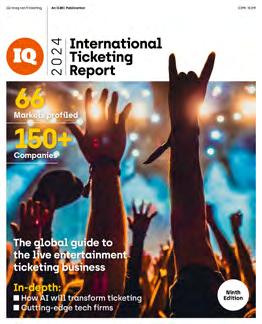
PRO: TONO
Compensation is calculated by gross box office takings per concert:
10% share of box office takings up to NOK 20,932
8% share of box office takings up to NOK 62,921
4% share of box office takings up to NOK 209,319
2% share of box office takings over NOK 209,320 Concerts without box office takings:
Up to 100 listeners, per concert: NOK 755 Over 100 listeners, extra charge per person: NOK 3.43
PRO: COMPASS
For concerts and ticketed entertainment:
Ticketed events: Fee of 2.5% of gross receipts, subject to a minimum of $150 per show. Complimentary tickets: Royalty charge based on 2.5% of the lowest full (undiscounted) commercial ticket price.
PRO: SAMRO
2% of ticket sales/revenue or a cost per person on a sliding scale depending on the amount of people attending or capacity of the venue:
Capacity Per person
0–1,000 ZAR 21.031,00
1–5,000 ZAR 16.835,00
1–10,000 ZAR 12.6110,00
1–30,000 ZAR 9.8230,00
1–50,000 ZAR 9.1250,00
1–70,000 ZAR 8.41
70,001 + ZAR 7.01
PRO: SGAE
A recent decision by a Spanish court required SGAE to lower its public performance rate for concerts to be more in line with its European counterparts. SGAE has already lowered its rate from 10% to 8.5% of box office revenue.
PRO: STIM
STIM charge a scaled fee per visitor ranging from SEK 5.11 for each free ticket to SEK 15.48 for up to 651–700 tickets. Tickets beyond 700 are charged at 2% of gross revenue (excluding VAT). Multi-day events with paid tickets are charged at 5.5% of gross ticket revenue (excl. VA, min SEK 5.56 per visitor per day) and 2.5% of gross ticket revenue exceeding SEK 1.5m (excl. VAT).
PRO: SUISA
Licence fee rates:
Concerts: 7.5% to 1 %
Concert-like performances/open-air festivals: 7% to 8.5%.
The licence fee shall always be a minimum of CHF 40 per event for copyright and between CHF 10 and CHF 40 for neighbouring rights. The percentage cannot exceed 10% of the ticket revenues or costs.
Discounts: Members of relevant Swiss trade associations may be eligible for discounts on these rates and a 2% rebate if invoices are paid within ten days (cash discount).
PRO: SPA
Paid admission events: 5% of the receipts corresponding to the venue’s full capacity, with minimum tariffs applicable according to the venue size (ticket price x full capacity x 5%). Free entrance for capacity above 15,001 seats is charged 5% over production costs with a minimum tariff corresponding to venue size. A 10% discount is applied to annual licences settled prior to the performance.
PRO: ZAIKS
Ticketed concerts: 8% of the total revenue from ticket sales for audiences of up to 4,000. 6% for concerts that host more than 4,000 participants.
Ticketed festivals: 5% of the total ticket revenue. Free entry: The tariff is set at 10% of the remuneration that performing artists earn for such an event. Tariff discounts of up to 30% if certain criteria are met, for example, organisers represented by an association of promoters can receive a 15% discount.
PRO: MESAM
Ticketed events: 6% of total gross income. If the venue already has a general Public Performance Licensing Agreement, the 6% tariff rate reduces to 4%. For both free and paid events, certain organisers may be offered discounts based on contractual clauses with societies.
PRO: PRS for Music
Promoters/venues pay a licence fee of 4.2% or 4% of box office revenue subject to a minimum charge of £16 for shows taking place under this tariff. Under the PRS Gigs and Clubs Scheme for small venues, a set licence fee (currently £12.40) per show applies. Festivals are charged at between 2.5% and 2.7% of gross receipts.
PRO: BMI
Up to 2,500 seats: 0.8% of revenue
2,501 to 3,500: 0.6% of revenue
3,501 to 5,000: 0.4% of revenue
5,001 to 9,999 seats: 0.3% of revenue
10,000 or more seats: 0.15% of revenue


A subscription to IQ gives you exclusive, 360-degree coverage of the live music business
Regular editions of IQ Magazine (choice of print or digital)
Unlimited access to industry-leading news, articles and insight
Exclusive interviews with industry leaders, long-form analysis and features
All of our annual reports
Access to all of our previous magazines and yearbooks FROM JUST £8 PER MONTH!


Fluctuations in currency exchange rates can have farreaching consequences for international tours. Political instability, interest rates, inflation, and major governmental changes can all have a profound impact on the value of currency, the knock-on effect of which can affect the income of artists touring the world. With a well-thought-out currency strategy, touring companies are able to mitigate such risks posed to their income and budgets. And to make sure that a touring party’s interests are as protected as possible, it’s important to take advice from professionals.
Freddy Greenish and Simon Liddell are the founders and directors of Chorus TM. A leading global payments and expense management platform specialising in the touring industry, they are experts in managing foreign exchange. Here they share thoughts on the 2025 currency landscape, as well as tips on managing foreign exchange at every step of the tour planning and recouping process.
Foreign exchange (FX) is the world’s most traded investment market, and the currency exchange rate is the most important determinant of a country’s economic health. These rates move constantly as markets digest new information and react accordingly. The best way to measure a currency’s strength is over time, as economies become stronger and others weaken. For example, the British pound (GBP) has halved in value against the US dollar (USD) over the past 50 years.
There have been some big swings in currency exchange rates over the last few years. Brexit saw GBP lose 13% value, and Covid saw GBP lose 12% value against the USD in just two weeks. The result of this was that UK-based artists that had currency sitting in dollars were suddenly better off, but those needing to pay costs in USD saw their profit shrink or disappear. Such shifts in currency exchange rates have the potential to make or break a business, and with 30 years of experience in this industry, we have a unique insight into the foreign currency challenges faced by touring companies.
USD
2024 saw an “election supercycle” take place, with 77 countries around the world – representing half of the global population – going to the polls. Donald Trump’s win in last year’s US election also saw the Republicans gain control of the Senate and the House, therefore increasing his chances of implementing policies of lower taxes, deregulation, and protectionism. This will likely boost the value of the US dollar, which has consistently been among the best performing currencies and is widely considered a safe haven currency whose value retains or increases in times of uncertainty.
The British pound fared well in 2024, as economic growth proved to be stable, and UK interest rates remained high. In September, GBP was the best performing currency among the G10 of economically advanced nations; however, the autumn 2024 Labour budget and the start of this year have seen sterling drop significantly. Rachel Reeves’ mix of spending increases, high taxes on business, and extra borrowing for investment has concerned the market. The gilt market (the rate at which the British government can borrow money) has risen to highs not seen since 1998. To meet these increased costs, taxes will have to increase further or spending plans cut.
The outlook for 2025 is now uncertain, and further concerns for the prospect of stagflation are rising –meaning high inflation, low economic growth, and high unemployment.
The Bank of England has downgraded its growth forecast, with fears over the status of the UK economy and job market. If the labour market data reflects business’s concerns and unemployment starts ticking up, the Bank of England will be forced to react. An aggressive monetary policy in 2025 could see quarterly interest rate cuts until the base rate hits 3.25% in 2026. Taking these all into consideration and lower relative interest rates will generally result in a weaker pound.
The European economy is far more vulnerable to trade policies imposed by the US than the UK, and the European Central Bank (ECB) has taken action to aggressively cut interest rates to support a weak economy. Structural issues in Germany and political instability in France will put further pressure on the euro throughout 2025, and the only way the ECB can react is by further cutting interest rates.
Many current geopolitical challenges are unresolved, and all can have a huge impact on currency rates. Peace and prosperity need to be promoted over economic uncertainty and aggression. As Israel’s war with Hamas continues and there are fears of other countries in the region becoming involved, the US could be forced to become more directly involved.
Russia’s invasion of Ukraine continues although Trump has pledged to “solve” the conflict. That could mean withdrawing US backing if Ukrainian president Volodymyr
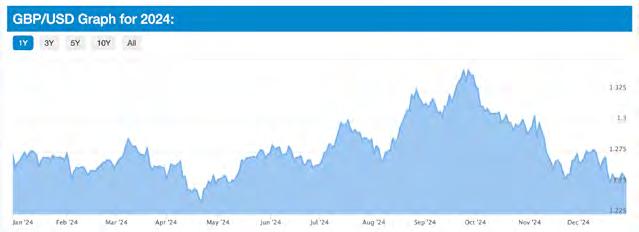

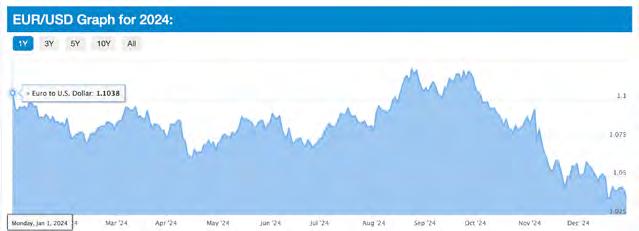
Zelenskyy doesn’t accept a ceasefire. This would no doubt reduce the intensity of the conflict substantially, but whether that would be a long-term solution to the problem is highly unlikely.
Touring globally means considering and managing multiple currencies and understanding how revenue can be maximised while minimising costs. Although there is no perfect solution, artists and their teams can benefit from being proactive rather than reactive when it comes to foreign exchange, and there are a number of ways to protect touring operations against the potential impact of unknown factors.
When preparing for a tour or project that will be exposed to foreign currency, we recommend speaking to an FX expert at the earliest opportunity. Once an account is open, and for no fee, we can help – f rom the early days of budgeting and pricing up a tour to looking at the best way to manage currency cash flow s.
We like to look at historical charts and trends for the 3, 6, and 12 months preceding the touring period, which can give us an idea of general trends and allows us to look at potential levels where currency rates will meet resistance and support. We can then work with our clients
by targeting specific rates.
Get paid in local currency. This gives you control as to how much you want to exchange and when. It also lets you go to the market to receive a rate that you’re happy with, rather than having a poor rate imposed on you . Being paid in local currency allows you to net off income against costs and to avoid converting currency twice.
We would always recommend using forward contracts to lock a rate for a future cost or fee. Forwards are used to mitigate currency risk so that artists and teams can undertake touring activities without fear of the currency moving against them . It might be the case that a t the end of the tour, the rate has moved in your favour – but equally, it can move in the other direction, and the effects of this need to be considered.
Technology continues to grow at pace and that’s particularly relevant in financial services. Speaking to bots and not being able to speak to a human can cost you money and also add a huge amount of frustration. Cutting-edge technology and great service do not have to be mutually exclusive, so we’d advise you to work with companies that provide both: a platform where you can access everything yourself but where you also have the support of a designated account manager and dealer that can be called directly when needed.
We’d all like to know what the future holds, but if a lesson has been learnt over the past few years, it’s that anything can happen. With 30 years’ experience in the currency markets, we frequently speak with FX traders at the world’s most prominent banks – who will often express opposing opinions on where rates are going. Some will be right and others wrong, but it’s important to remember that it’s just one person’s opinion and to be wary of anyone that tells you the exact rate of where a currency will be in the future. The key skill required to be successful in managing foreign exchange is adaptability in the face of a constantly changing landscape.
1 ONLY WORK WITH TRUSTED PEOPLE WHO HAVE BEEN RECOMMENDED TO YOU
There are many FX companies out there and, as in all industries, some are less reputable than others, so we’d
advise against accepting cold calls from FX companies who are generally looking to make a quick buck. Some companies can be too big and cover all types of businesses without understanding the unique challenges of touring. All of our clients are referred to us from trusted advisors in this field, and when picking a specialist provider, reputation, integrity, and service need be at the forefront.
SPEAK TO AN EXPERT & BE PROACTIVE
Timing is of the essence, and as a minimum, you should receive a weekly update from your FX dealer that summarises the last week’s news and the major, market-moving events for the coming week. Most of our clients don’t have time to constantly look at the rate; that’s our job. Our dealers know what our clients need to do and in what timeframe. They can quickly react to any opportunities and large movements and call you instantly to make you aware of changes and opportunities that could impact you or your touring activities.
3
REVIEW YOUR FOREIGN CURRENCY ACCOUNTS & HOW MUCH THEY COST YOU
If you are receiving foreign currency into your local bank account, you could be losing 3–4% on each transaction. The cost of opening and maintaining foreign currency accounts is also getting more and more expensive. A tip is to check how much this costs you each year, as it can be costing thousands in unnecessary fees. There are a few companies like Chorus TM that provide clients with their own named multi-currency

IBAN to receive (in our case) 38 different currencies into one named account. These accounts are often free, and rates are more competitive than with a traditional bank. Another tip is to review your SEPA and SWIFT payment fees because these can also add up.
Pay in local currency in the territory, rather than using your domestic credit/debit/AMEX card and being exposed to the high costs and poor rates that these can offer. By using a platform with access to multi-currency cards and expense management in one place, cardholders are able to photograph receipts, attach documents to payments, and add annotations and notes to every transaction. This saves everyone’s time – especially that of the accounts team reconciling the tour, and less time often means lower costs.
We see millions of pounds go through our online platform, but we will always recommend speaking to an FX dealer to execute larger trades. At Chorus TM, our dealing team has access to three Tier 1 banks and is able to negotiate on your behalf. They will execute the trade and make forward remittance for you, offering support throughout the process in the knowledge that many clients aren’t comfortable doing this themselves.
Forward contracts are used to mitigate currency risk, and once contracts are finalised, to take advantage and fix an exchange rate that you are happy with.
In the immediate aftermath of Covid, there was apprehension from clients to fix an exchange rate in the future when there was so much doubt as to whether a tour would be able to take place as planned. At that point, we saw an increase in clients taking the spot rate when receiving funds. In 2025, there is more certainty, and we’ve seen that the number of forward contracts we’re being asked to execute has risen to higher levels than we were seeing pre-Covid, as clients feel more confident to fix rates for touring activities for up to two years ahead.
By not considering forwards, you are susceptible to foreign currency market fluctuations between your budgeted rate and the rate you pay/receive in foreign income. When converting at spot, the rate might be better than you’ve planned, but if the spot rate is drastically worse, this can result in significant losses on your touring income. In order to lock a forward contract, a deposit needs to be paid, and if cash flow is tight, this can be difficult, but to mitigate the risk of loss, we’d advise considering a mixture of forward and spot trades.
A number of our clients will hedge forward half of their requirements. They might take a forward contract so that they know exactly what their costs are going to be, and this allows them to run a little more risk on their profit.

This gives clients more stability in budgeting, while giving them the opportunity to benefit from potential upswings in the currency market: if the rate goes in their favour, they’ll receive more revenue on the remainder, but on the other hand, if the market moves against them, at least part of the risk has been covered.
We often stress to our clients that once the forward rate is fixed, what happens afterwards is irrelevant. You should be able to draw down against the agreed rate as funds become available, and if you’re happy with the rate and it matches your budgeted rate, then this frees up your time to stop worrying about currency fluctuations and to focus on delivering the tour. As we all know, there are plenty of other unknowns to address on tour, so using forward contracts for the entirety of a tour’s budget can offer a certain level of stability.
With 30 years' experience in finance and specialising in music/film/entertainment, Freddy Greenish and Simon Liddell launched Chorus TM as an alternative banking solution for the touring industry in 2024. Their cutting-edge platform has set new standards of service to provide multi-currency named IBANs; international and domestic payments; multi-currency virtual/physical cards; FX and hedging.
Chorus TM is dedicated to helping their clients maximise their revenue, minimise their costs, and improve the processes behind touring globally.
chorus-tm.com
Leading companies across the industry use the newly revamped IQ Jobs board to reach a highly targeted audience of 15,000+ music industry professionals every month.
Each listing is also included in our IQ Jobs mailer, which is distributed to all IQ Index subscribers.
To make sure you find the right candidate, list your next role at:
For more information, and discounts on multiple listings, contact: Gareth Ospina gareth@iq-mag.net
KATE BACKHURST
Global Visa Specialist
Viva La Visa
+44 (0)1473 892660 vivalavisa.co.uk
ROBERT BAIRD
President
BAM! Baird Artists
+1 800 867 3281 robert@bairdartists.com bairdartists.com
PETE BOTT
Partner & Head of Music
Blacks Solicitors LLP
+44 (0)113 207 0000 pbott@lawblacks.com lawblacks.com
MARK CARTER
Partner
Prager Metis LLP
+44 (0)20 7632 1400 mcarter@pragermetis.com pragermetis.com
ANDY CORRIGAN
Founder
Viva La Visa
+44 (0)1473 892660 vivalavisa.co.uk
TODD DYER
Vice President & Head of Live Entertainment Sales
Cast & Crew
+1 760 688 8113 todd.dyer@castandcrew.com castandcrew.com
OLEG GAIDAR Director
WTA Consulting Ltd
+44 (0)7495 421142 og@wtaconsulting.co.uk wtaconsulting.co.uk
FREDDY GREENISH Director
Chorus TM +44 (0)203 576 0403 freddy.greenish@chorus-tm.com chorus-tm.com
STEVEN HOWELL Head of Music
Howden Insurance
+44 (0)207 009 3729 steven@musicinsurance.net howdeninsurance.co.uk
PROF DR RALF KITZBERGER Lawyer
Schickhardt Rechtsanwalte +49 714 16487 141 kitzberger@schickhardt-law.com schickhardt-law.com
LEWIS LAWRENCE Solicitor
Russells Solicitors
+44 (0)20 7439 8692 lewis.lawrence@russells.co.uk russells.co.uk
MATTHEW MEREDITH CEO
London Market Partners Group (LMP Group)
+44 (0)204 540 5056
matthew.meredith@lmp-insurance.com lmp-insurance.com
DR DICK MOLENAAR
All Arts Tax Advisers +31 10 4363 555 dmolenaar@allarts.nl allarts.nl
KEVIN OFFER Partner
Hardwick & Morris LLP
+44 (0)207 268 0100 kevin@41gp.com hardwickandmorris.co.uk
STEVE RICHARD
Managing Director T&S Immigration Services LTD
+44 (0)1969 663 983 steve@tandsimmigration.co.uk tandsimmigration.co.uk
TIM THORNHILL
Director, Entertainment & Media Tysers Live
+44 (0)203 915 0385 musicandevents@tysers.com tysers.com/tyserslive
PAUL TWOMEY Partner
Specialist Risk Entertainment & Sport
+44 (0)203 059 9410 ptwomey@specialistrisk.com specialistrisk.com
Managing Director GGW GmbH
+49 (0)40 30 100 8 25 johannes.von.rauchhaupt@vrus.de ggw.de
STEVE WREN Tax Partner
SRLV
+44 (0)207 079 8858
steven.wren@srlv.co.uk srlv.co.uk

Worrying about your payroll means less time to focus on your productions.
Cast & Crew Live Entertainment has more than 30 years of experience as the leading provider of employer-ofrecord payroll services for tours, production service companies, venues, and more, so you can trust us to successfully manage your payroll and stay focused on bringing your productions to life.
Workers’ Compensation Insurance
• Pay as you go as a percentage applied to payroll processed
• Every paid crew member covered on your behalf
• All claims handled seamlessly by our team of experts, with care advocates assigned to each claim
Expert guidance on every production’s wage and hour laws, including:
• Multi-state tax filing in all 50 US states
• Unemployment claims management
• Year-end W-2 tax document filing
Digital onboarding and timecards included, at no extra cost
Instant and free full access to onboarding, timekeeping and other vital tools so your production runs more smoothly. Nothing is mandatory; simply use what works best for you and your crew.


Always on the money.